200+ Academic Citations
Bad Democracy
The Framers of the US Constitution distrusted democracies. Commenting on the dangers of assemblies, James Madison famously opined that “had every Athenian citizen been a Socrates, every Athenian assembly would still have been a mob.” He felt that governments needed some shelter from the impetuous passions and partisan anger of the people. Without protections, he felt, democracies were “as short in their lives, as they have been violent in their deaths.”
As such, the word ‘democracy’ is absent in both the Constitution and the Declaration of Independence. Though the former opens with the phrase “We the People” it quickly enumerates the numerous ways in which the citizens are removed from the inner stuffing of government (indirect and infrequent elections, secret committtees, life-time terms for justices, etc.) Ironically, Constitutions, by their very nature, are anti-democratic.
The Framers’ concern with a government run by the people found its roots with Aristotle who viewed democracy as one of the three most corrupt forms of government (along with tyrany and oligarchy). A collector of 153 ancient consitutions, Aristotle concluded that democracies are prone to mob rule, demagoguery, and capture by the wealthy.
Historical events support Aristotle’s claims. Hitler, Mussolini, Fujimoro, Hugo Chavez etc. were elected into office in free and fair elections. And Socrates was famously put to death by the people for speaking out against the democratic leaders of his time.
In the US, the embrace of democracy continues to soar despite a series of misteps. In the 1820s, a vast increase in citizen participation and suffrage combined with more direct elections of Presidents. As a result, populist firebrand and war hero Andrew Jackson won office and tumult ensued. And since the 1820s, slander, boastful campaigning and attack ads have become the norm.
More recently, referendum mania in California quickly drove the state bankrupt. Right to Work laws, which gut union power, are more likely to pass when the debate and decisionmaking is opened more broadly to union membership. And increased ‘democratic’ transparency of legislatures (a phenomenon of the 1970s) has led to capture, a soaring rise in lobbying, and a further explosion in campaign finance and attack ads.
To the extent that they drew on classical governments for inspiration or illustration, the Founders much preferred republican Rome (or even timocratic Sparta) to Athenian democracy. Their hero Montesquieu whose book the Spirit of the Laws revolutionized political philosophy. It focused on the separation of powers, where the most important separation was not between the executive, legislative or judicial branches, but from the people themselves.
Montesquieu wrote “The people should not enter the government except to choose their representatives.” He came to these conclusions based on history, writing “A great vice in most ancient republics was that the people had the right to make resolutions for action, resolutions which required some execution, which altogether exceeds the people’s capacity.”
Like others, he noted that to this problem of overt democracy is our seemingly blinkered embrace of the wisdom of crowds and good will of ‘the people.’
By James D’Angelo – October 5, 2023
Citations
Below, we collect citations showing the evolution of the peception of democracy – from something to be avoided and even abhorred, to a panacea form of government. At the same time, our understanding of the benefits of a republic has diminished. This can be seen in the wild changes of fortune between the two words.
Real liberty is neither found in despotism or the extremes of democracy, but in moderate governments.Alexander Hamilton 1787
Constitutional Convention
Aristotle suggested that when you have voting and you have elections, you don’t end up with the rule of the middle class or the rule of the poor, you end up with the rule of the rich.Loren J. Samons II 2016
Boston University Rhett Talks
We are faced with a stark choice, democracy or ecological survival.Mathew Humphrey 2007
Ecological Politics and Democratic Theory (Climate)
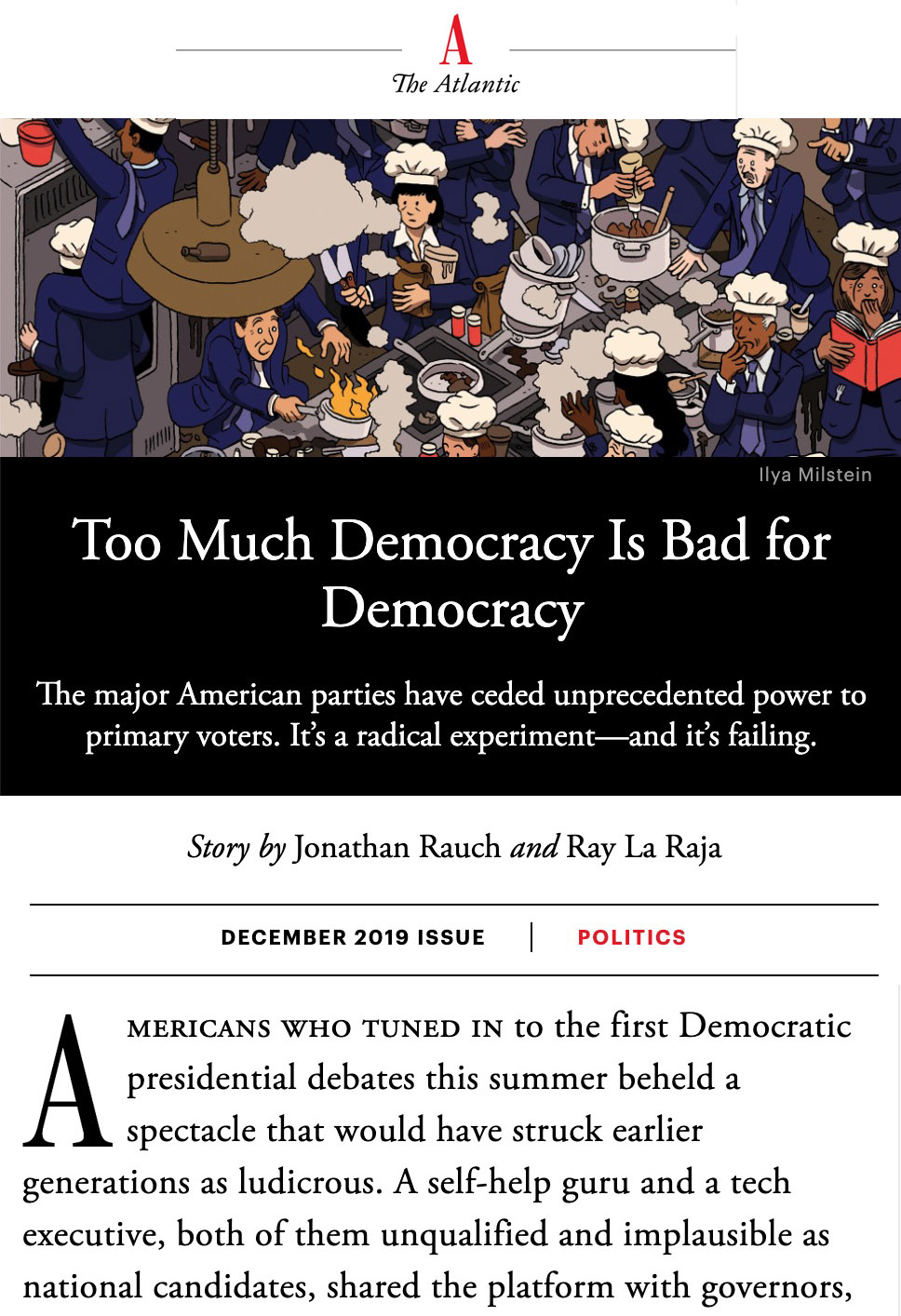
Rauch & La Raja 2019 - Too Much Democracy Is Bad for Democracy

Rauch & La Raja 2019 - Too Much Democracy Is Bad for Democracy
Paradoxically, democratic fundamentalism – the insistence that the remedy for whatever ails democracy must always be more democracy – is dangerously undemocratic.Jonathan Rauch & Ray La Raja 2019
Too Much Democracy Is Bad for Democracy
[The authors of the Constitution] regarded the prospect of rule by the people as tantamount to anarchy.Virginia DeJohn Anderson 2019
The Problem of Democracy (New York Times)
A Reuters analysis released last week shows that state court justices who are elected uphold more than twice as many death sentences as justices who are appointed.Equal Justice Initiative 2014
Elected Judges Uphold More Death Sentences
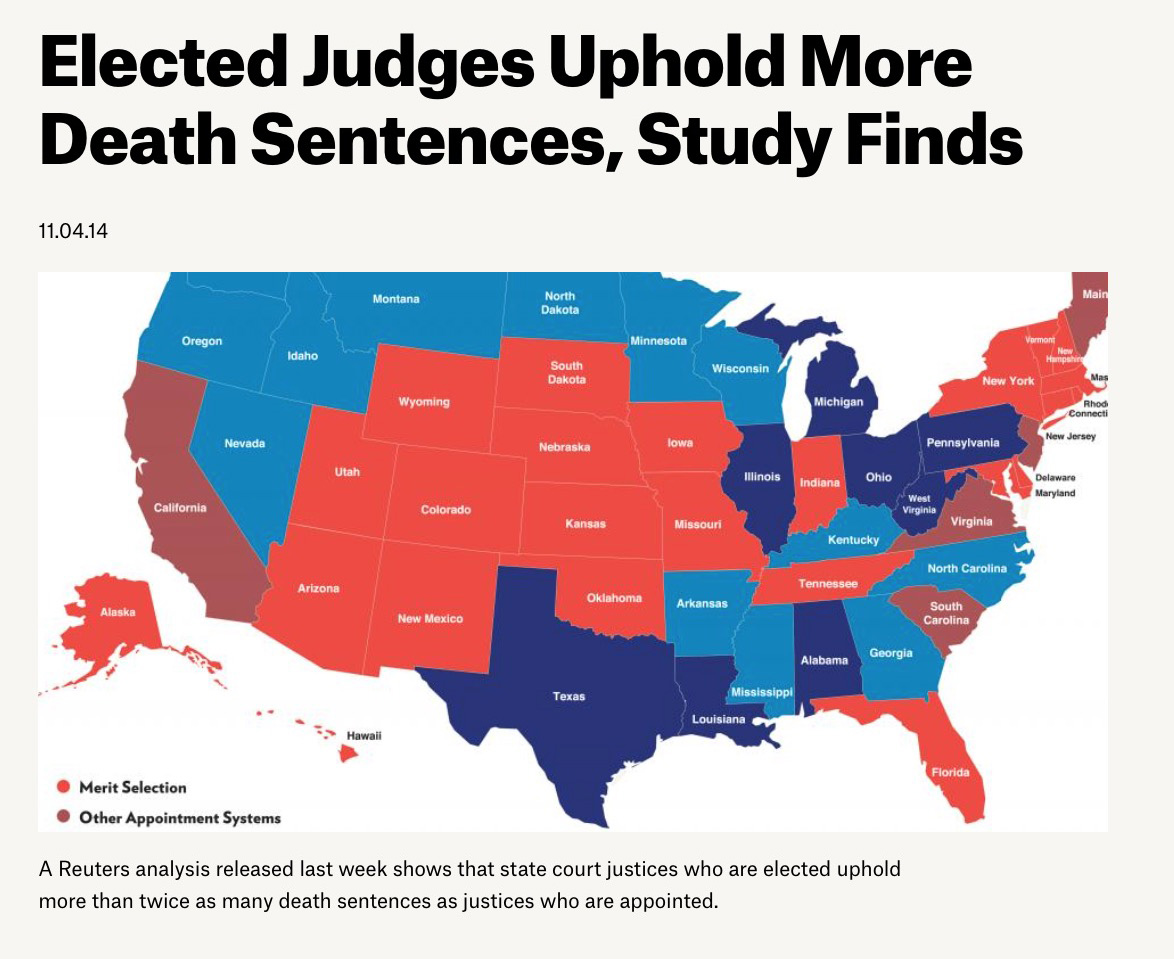
Equal Justice Initiative 2014 - Elected Judges

Equal Justice Initiative 2014 - Elected Judges
The democratic idealists of practically all schools of thought have managed to remain remarkably oblivious to the obvious facts.Reinhold Niebuhr, 1944
The Children of Light and the Children of Darkness
Democracy has never been and never can be so durable as Aristocracy or Monarchy. But while it lasts it is more bloody than either.John Adams 1814
Letter to John Taylor
In Yugoslavia, democracy became the tool of mass murder. In Rwanda, a Western-backed multiparty election separated out the tribes and contributed to genocide.Stephen S. Rosenfeld 1997
Democracy: The Down Side
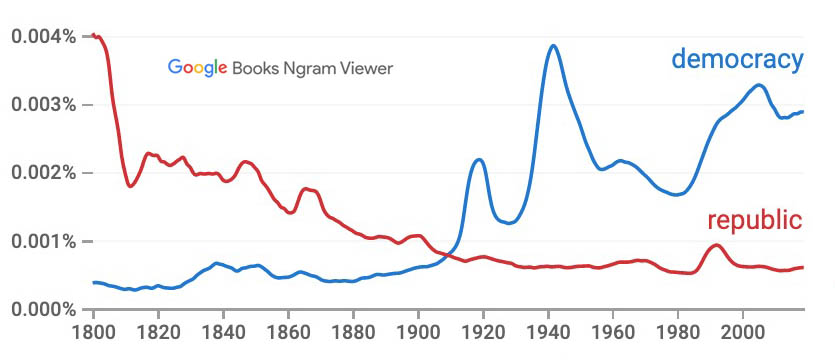
Google Ngram 2021 - Democracy vs. Republic
The Google Ngram Viewer or Google Books Ngram Viewer is an online search engine that charts the frequencies of any set of search strings using a yearly count of n-grams found in sources printed between 1500 and 2019.

Google Ngram 2021 - Democracy vs. Republic
One reason why democracy tends to produce decent outcomes is that educated, elite political insiders tend to control the political parties and the bureaucracy. To a significant extent, these elites prevent the people from simply getting what they want.Jason Brennan 2016
What History Teaches Us About Demagogues
Small-d democratic-citizen participation has led to profoundly regressive outcomes.Annie Lowrey 2022
Four Years Among the NIMBYs
Expansion of the number of voters, in effect, tended to empower rather than diminish factional influence precisely because the electorate became so vast that only those who had the time, money, and interest to organize it could gain power.Nathan Gardels & Nicolas Berggruen 2019
Renovating Democracy
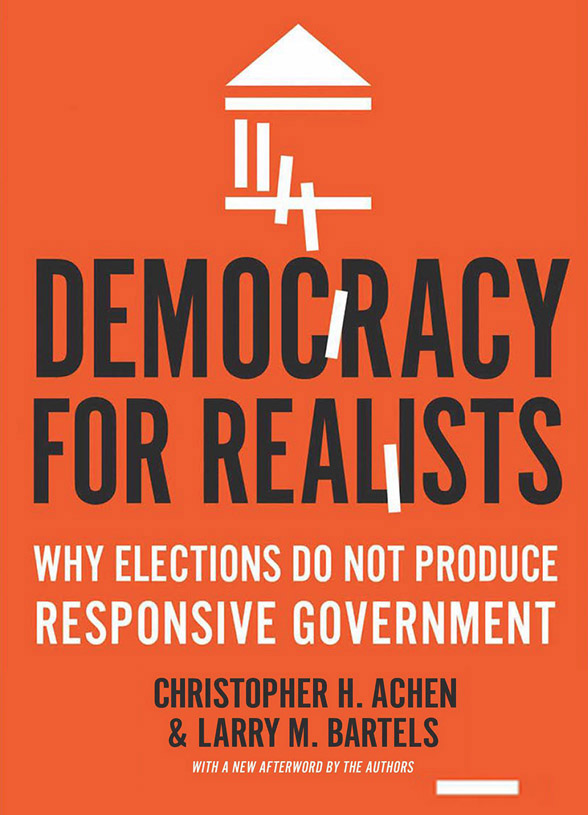
Bartels & Achen 2016 - Democracy for Realists

Bartels & Achen 2016 - Democracy for Realists
In short, since each successive fiscal fix at the ballot box was short-term and piecemeal, direct democracy (via referendums and initiatives) deepened the dysfunction of state government instead of improving the situation.Nathan Gardels & Nicolas Berggruen 2019
Renovating Democracy
Of course, every student of political science knows that the American system of government codified in the United States Constitution is not actually a “democracy” as that term was defined in the eighteenth century. In fact, most of the American Founders considered “pure” democracy like that practiced in ancient Athens – where the people ruled themselves directly through votes in a popular assembly – to be a particularly unstable and dangerous form of government.Loren J. Samons II 2007
What’s Wrong with Democracy?
Rather than being the curb on elites that they were supposed to be, ballot initiatives (direct democracy) have become a tool of special interests, with lobbyists and extremists bankrolling laws that are often bewildering in their complexity and obscure in their ramifications.Economist 2011
The Perils of Extreme Democracy
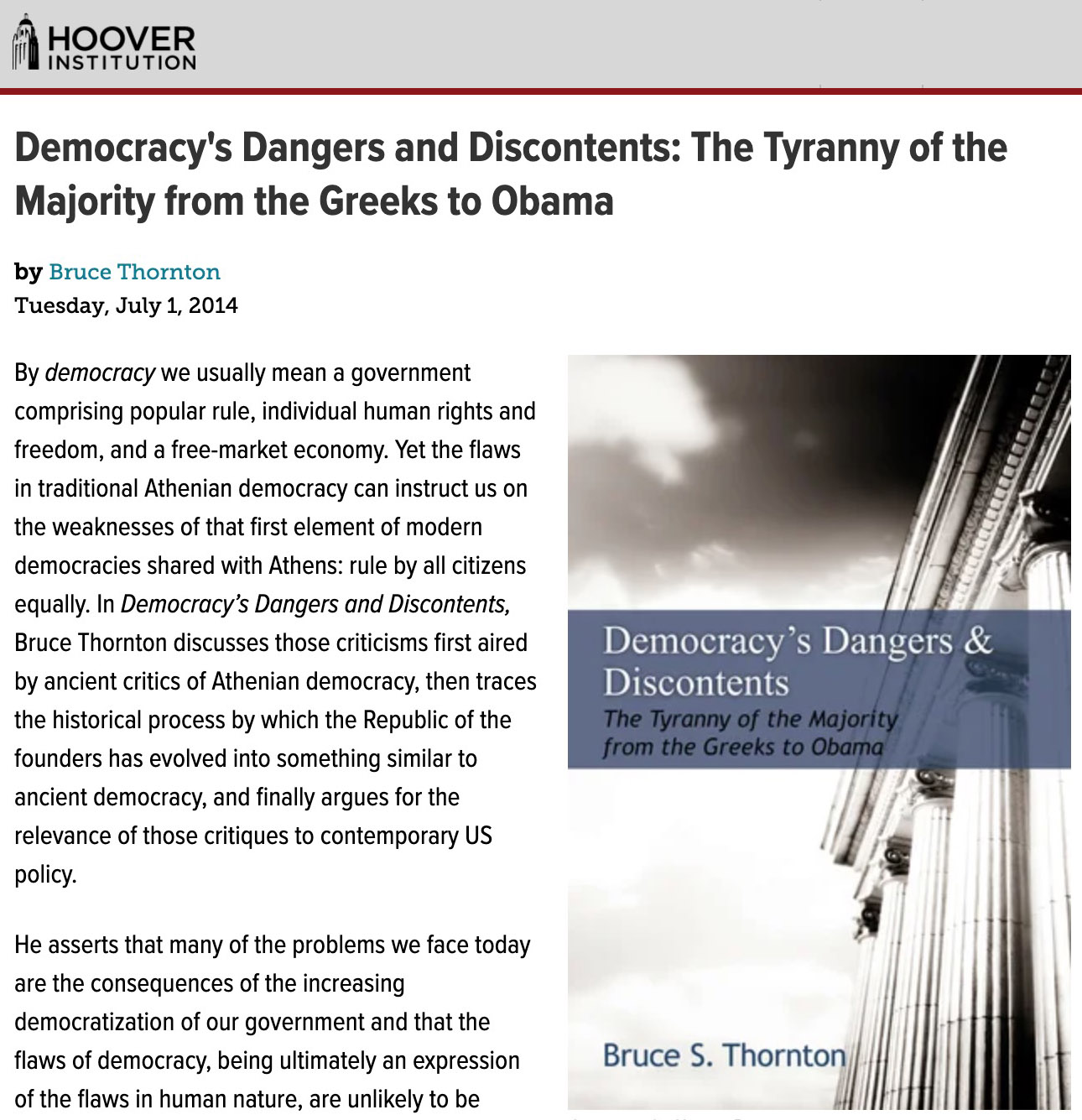
Bruce Thornton 2014 - Democracy’s Dangers and Discontents

Bruce Thornton 2014 - Democracy’s Dangers and Discontents
There is no dictatorship in Louisiana. There is a perfect democracy there, and when you have a perfect democracy it is pretty hard to tell it from a dictatorship.Huey Long 1935
The Perils of Extreme Democracy
Our chief danger arises from the democratic parts of our constitutions. It is a maxim which I hold incontrovertible, that the powers of government exercised by the people swallows up the other branches. None of the constitutions have provided sufficient checks against the democracy.Edmund Randolph 1787
Constitutional ConventionNOTE: As Michael Klarman writes “The delegates assembled at the Philadelphia convention in May of 1787 mostly agreed with this assessment of Governor Edmund Randolph.”
In a constitutional democracy we try to reconcile our commitment to self-governance with our understanding that there are times when the majority must not be allowed to do certain kinds of things. The tension is irreducible. There are times when the majority must be permitted to act, self-governance demands it, and there are times when the majority must be prohibited from acting – our commitment to constitutionalism, indeed our commitment to the Bill of Rights, demands as much.John E. Finn
Lecture 1 - Civil Liberties and the Bill of Rights
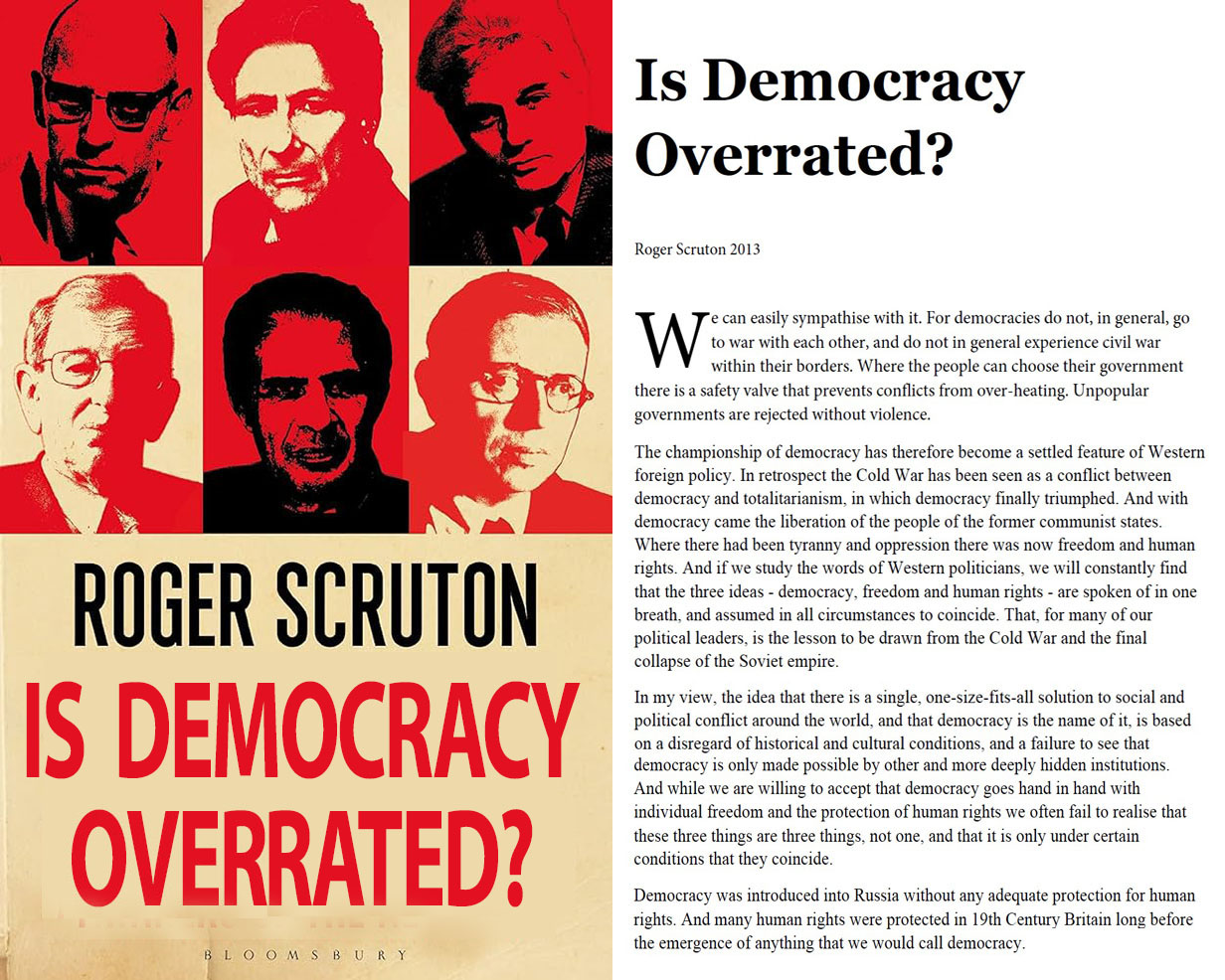
Roger Scruton 2013 - Is Democracy Overrated?

Roger Scruton 2013 - Is Democracy Overrated?
Democracy was introduced into Russia without any adequate protection for human rights. And many human rights were protected in 19th Century Britain long before the emergence of anything that we would call democracy. In the Middle East today we find parties standing for election, like the Muslim Brotherhood in Egypt, which regards an electoral victory as the opportunity to crush dissent and impose a way of life that for many citizens is simply unacceptable. In such circumstances democracy is a threat to human rights and not a way of protecting them.Roger Scruton 2013
Is Democracy Overrated?
Making and enjoying money was never enough for Fred Koch, as it would not be enough for the son he groomed to be his successor. He had to have things his way. In 1958, after his victory against Universal Oil, Fred co-led a referendum drive to alter the state constitution in order to make it harder for unions to take root in Kansas. Fred was a passionate advocate of so-called right-to-work laws.Nancy MacLean 2017
Charles Koch, the Cato Institute, and the Makings of a Right-Wing EmpireNOTE: The Kochs have long used increases in democracy as a weapon to destroy unions and secure legislative advantages. In this single 1958 example there are two uses of such increases. 1. The Kochs put forth a referendum on unions. Often viewed as democratic time bombs (and with a long history of abysmal failure), referendums and initiatives are decided democratically. They allow the people to decide legislative proposals in a special vote and bypass the legislature entirely. Scholars now understand that referendums are elitist tools - they are expensive to set up and because the succeeding public discourse is controlled via expensive TV ads, they lower the bar of understanding and engagement. Once the 1958 referendum was approved for a public vote, the Kochs flooded the airwaves with biased and misleading ads. 2. The very concept of right-to-work is a seizmic increase in democracy with respect to union decision making. It is akin to a referendum, except even more insidious and surefure with respect to destroying unions. The key component of right-to-work legislation is the individual choice that each union member has to pay dues, which - from everything we know about collective action - assures that no dues will be collected. In a similar fashion if individuals were able to choose whether or not to pay taxes, there would be no government and full anarchy. Individually no one wants to pay dues, and the very thought that others will shirk leads to shirking en masse. These are just two of the many ways the Kochs have undermined government by employing increases in democratic choice.
How and why money should be so powerful in a democracy where each person has a vote and most voters, by definition, are not in the 1 percent has remained a mystery.Joseph Stiglitz 2012
The Price of Inequality
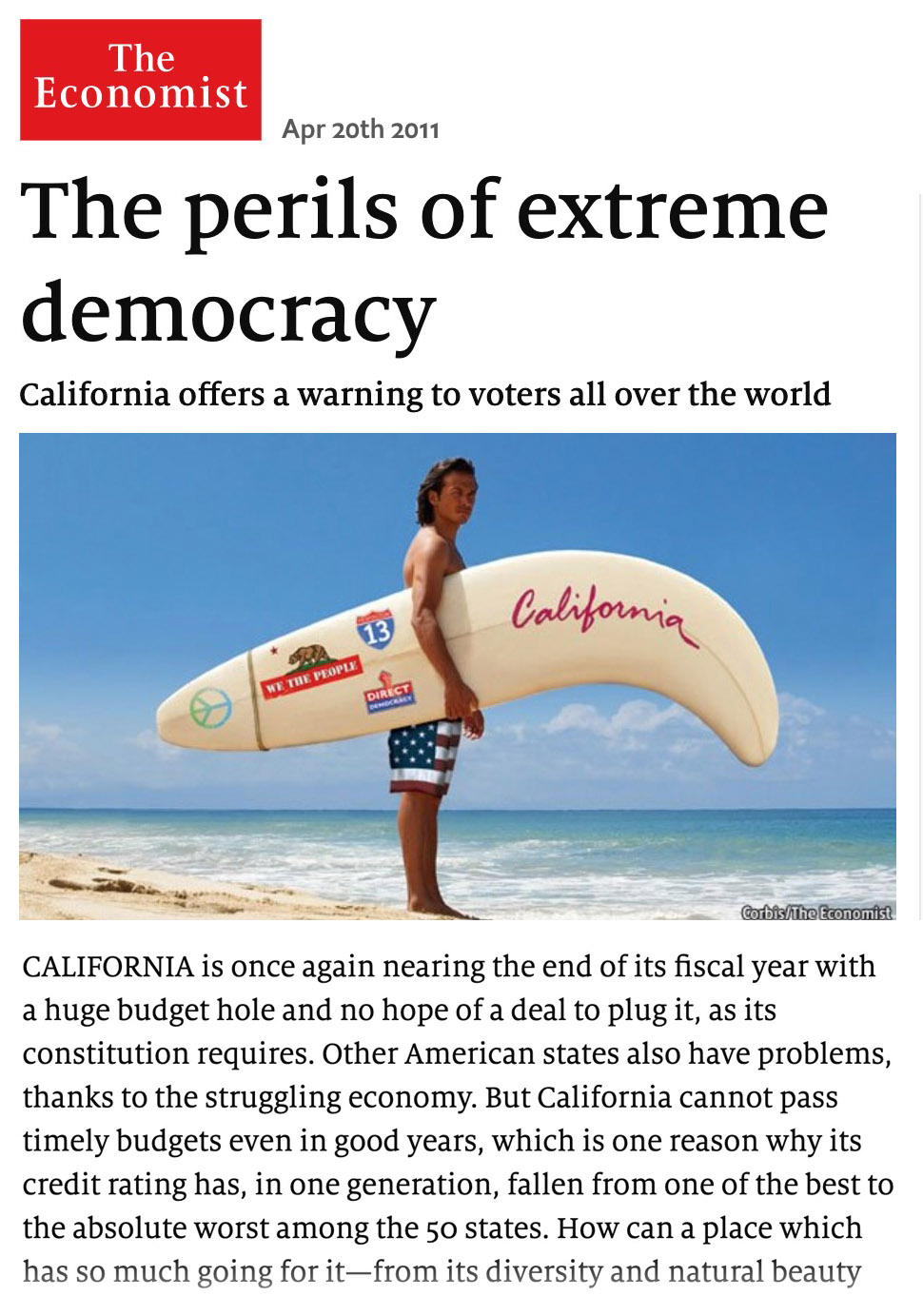
Economist 2011 - The Perils of Extreme Democracy

Economist 2011 - The Perils of Extreme Democracy
The great body of the people are without virtue and are not governed by any internal restraints of conscience.Rufus King 1787
Constitutional Convention
Historians who wrote about democracy into the middle of the 19th century almost never said anything good about it, including the Athenians themselves, who said almost nothing good whatsoever about their own form of government. And yet, we were holding it up as a model.Loren J. Samons II 2016
Pericles of Athens and the Dangers of Democracy
When you start looking at the history of Athenian democracy, you find all kinds of terrible problems. Athenian democracy didn’t even last for 200 years. And in those 200 years, it suffered two oligarchic revolutions.Loren J. Samons II 2016
Pericles of Athens and the Dangers of Democracy
The evils we experience flow from the excess of democracy. The people do not want virtue, but are the dupes of pretended patriots. In Massts. it had been fully confirmed by experience that they are daily misled into the most baneful measures and opinions by the false reports circulated by designing men, and which no one on the spot can refute.Rep Elbridge Gerry 1787
Constitutional Convention
It is admitted that you cannot have a good executive upon a democratic plan.Alexander Hamilton 1787
Constitutional Convention
But, in the United States, the majority, which often has the tastes and instincts of a despot, still lacks the most advanced instruments of tyranny.Alexis De Tocqueville 1835
Democracy in America
Because of the asymmetry of time and resources, elections are dominated by the organized and the moneyed who are then chosen to govern. Elections even favor the rise of aristocracy.Ganesh Sitaraman 2019
Renovating Democracy
But the people are gradually ripening in their opinions of government — they begin to be tired of an excess of democracy — and what even is the Virginia plan, but pork still, with a little change of the sauce.Alexander Hamilton 1787
Constitutional Convention
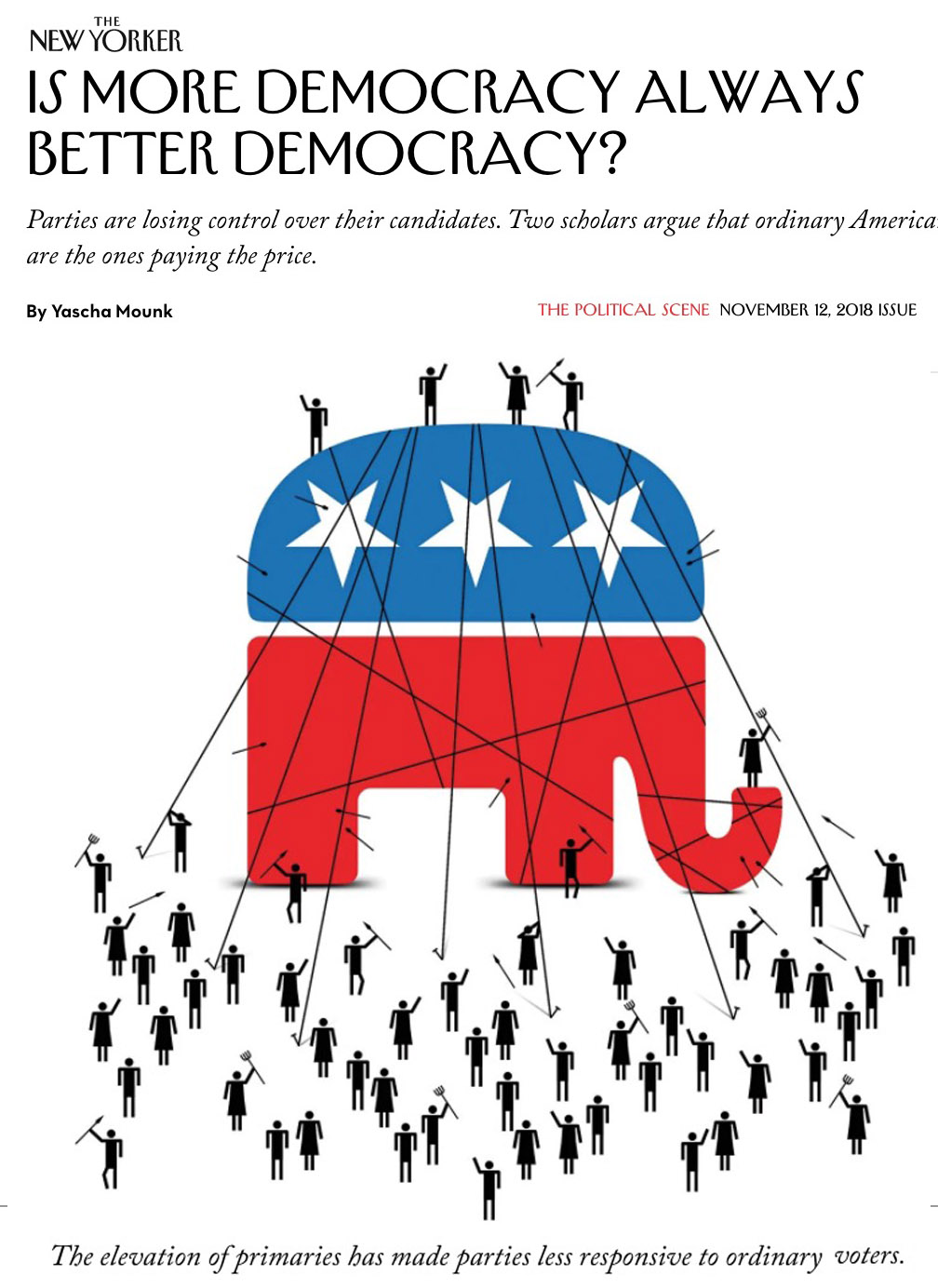
Yascha Mounk 2018 - Is More Democracy Better Democracy?

Yascha Mounk 2018 - Is More Democracy Better Democracy?
It must ever be remembered that the Mob is a Part of the People, and I begin to fear the most influential Part. The Mob has established every Monarchy upon Earth – The Mob has ultimately over thrown every free Republick… The Mob must ever be in the Power of Government – Government never in the Power of the Mob.John Adams 1795
Letter to John Quincy Adams
Liberal democracy, as it has developed in recent decades, shares a number of alarming features with communism. Both are utopian and look forward to “an end of history” where their systems will prevail as a permanent status quo. Both are historicist and insist that history is inevitably moving in their directions. Both therefore require that all social institutions—family, churches, private associations—must conform to liberal-democratic rules in their internal functioning. Because that is not so at present, both are devoted to social engineering to bring about this transformation. And because such engineering is naturally resisted, albeit slowly and in a confused way, both are engaged in a never-ending struggle against enemies of society (superstition, tradition, the past, intolerance, racism, xenophobia, bigotry, etc., etc.) In short, like Marxism before it, liberal democracy is becoming an all-encompassing ideology that, behind a veil of tolerance, brooks little or no disagreement. John O’Sullivan 2019
Foreword - Demon in Democracy
The aristocratic body [the Senate], should be as independent & as firm as the democratic [the House]. If the members of it are to revert to a dependence on the democratic choice, the democratic scale will preponderate. All the guards contrived by America have not restrained the Senatorial branches of the Legislatures from a servile complaisance to the democratic. If the 2d. branch is to be dependent we are better without it. To make it independent, it should be for life. It will then do wrong, it will be said... The mode of appointing the 2d. branch tended he was sure to defeat the object of it. What is this object? to check the precipitation, changeableness, and excesses of the first branch. Every man of observation had seen in the democratic branches of the State Legislatures, precipitation — in Congress changeableness in every department excesses agst. personal liberty private property & personal safety.Gouverneur Morris 1787
Constitutional ConventionNOTE: At the time Morris viewed the Senate as the aristocratic body, because it would not be subject to election by the general public. Instead it would be chosen by the state legisalures. Interestingly, Morris is also the author of the preamble of the Constitution, which begins with the celebrated words “We the People.”
The defenders of every kind of regime claim that it is a democracy, and fear that they might have to stop using the word if it were tied down to any one meaning.George Orwell 1946
Meaningless Words
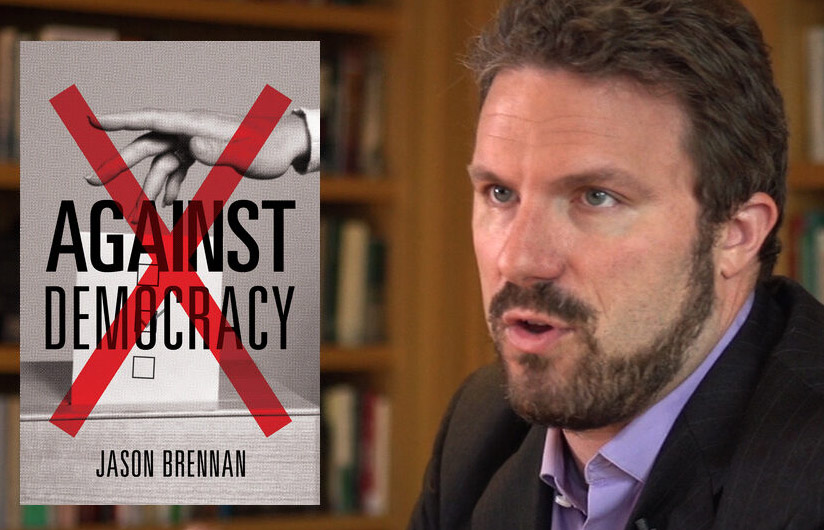
Jason Brennan 2016 - Against Democracy

Jason Brennan 2016 - Against Democracy
When a term has become so universally sanctified as “democracy” now is, I begin to wonder whether it means anything, in meaning too many things.T.S. Eliot 1940
Democracy in Translation
Today, a new form of government is sweeping across America: the initiative campaign, available in half the states and hundreds of cities. Where once most state laws were passed by legislatures, now voters decide directly on such explosive issues as medical marijuana, affirmative action, casino gambling, assisted suicide, and human rights through a new form of “direct democracy,” the very form of government the Founders feared most. The initiative process, ostensibly driven by public opinion, is, in reality, manipulated by moneyed interests, often funded by out-of-state millionaires pursuing their own agendas on a new frontier of American politics operating virtually without public scrutiny.David Broder 2000
Democracy Derailed - Initiative Campaigns and the Power of Money
According to Tocqueville, the “greatest complaint against democratic government... is not... its weakness, but rather its irresistible strength. What I find most repulsive in America is not the extreme freedom reigning there but the shortage of guarantees against tyranny” (DIM, 252). The tyranny to which Tocqueville refers is not the tyranny of aristocracy, monarchy, or oligarchy, but the tyranny of the majority, a tyranny of the people.Khalil M. Habib 2011
Machiavelli and Tocqueville on Majority Tyranny
A pure democracy…can admit of no cure for the mischiefs of faction. A common passion or interest will, in almost every case, be felt by a majority of the whole… and there is nothing to check the inducements to sacrifice the weaker party, or an obnoxious individual. Hence it is, that such democracies have ever been spectacles of turbulence and contention; have ever been found incompatible with personal security, or the rights of property; and have, in general, been as short in their lives, as they have been violent in their deaths.James Madison 1788
Federalist 10Note:
“For all the veneration of the ‘people,’ [to the Framers] the word ‘democracy’ retained an unequivocally negative connotation.” - Jill Lepore 2018
In the Federalist papers, ‘democracy’ was used as something to contrast their government to. Not once do they claim they are constructing a democracy and they often make reference to how democracies are easily captured by special interests and demagogues and lead to their own forms of tyranny.
Trial judges hand out more prison and jail time to defendants just before they come up for reelection...“No other nation in the world [elects judges],” said former U.S. Supreme Court Justice Sandra Day O’Conner, “because they realize you’re not going to get fair and impartial judges that way.”Gary Hunter 2009
Elected Judges More Punitive Just Before Elections
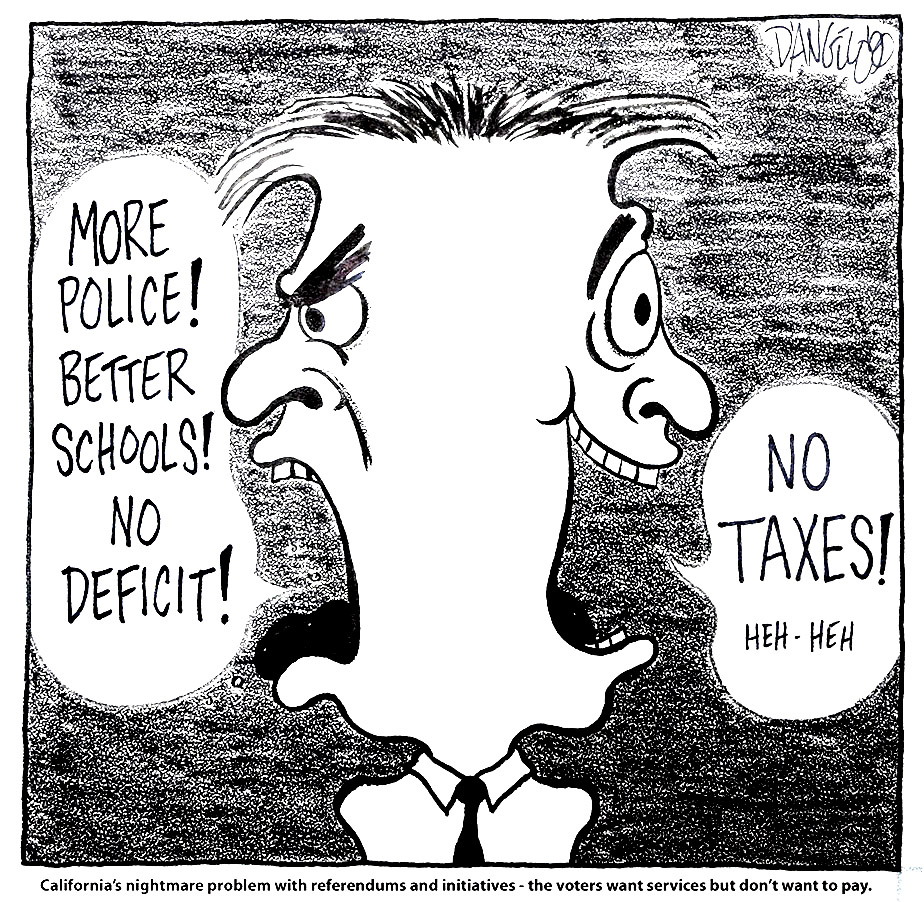
Gus D’Angelo 2008 - Nightmare of Ballot Initiatives

Gus D’Angelo 2008 - Nightmare of Ballot Initiatives
Nothing but a permanent body can check the imprudence of democracy. Their turbulent and uncontrouling disposition requires checks.Alexander Hamilton 1787
Constitutional Convention
The democratic idealists of practically all schools of thought have managed to remain remarkably oblivious to the obvious facts.Reinhold Niebuhr 1944
The Children of Light and the Children of Darkness
After all, direct democracy had been “practised in the free states of antiquity; and was the cause of innumerable evils. “To avoid these evils,” [Noah Webster] asserted [in 1787] , “the moderns have invented the doctrine of representation, which seems to be the perfection of human government. The Romans’ ignorance of that doctrine “exposed their government to frequent convulsions, and to capricious measures,” and much the same could be said for the Greeks ¬– for “pure democracy” is utterly “inconsistent with the peace of society, and the rights of freemen.” Paul Rahe 1992
Republics Ancient and Modern
[referencing the Constitutional Convention]
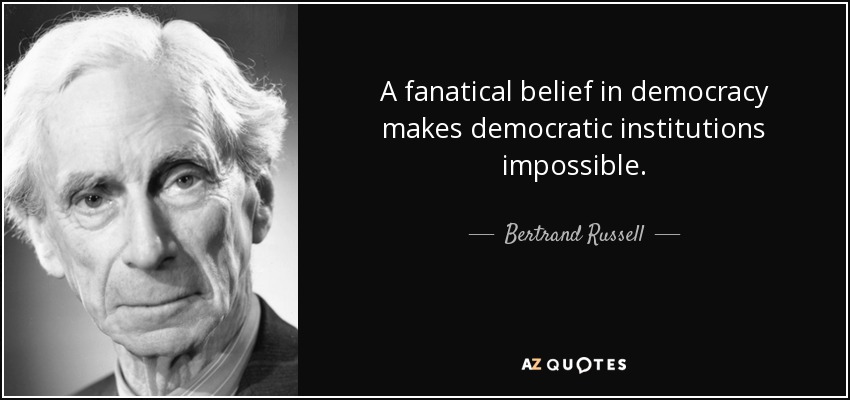
Bertrand Russell 1953 - What Is Democracy?

Bertrand Russell 1953 - What Is Democracy?
Democracy does not mean and cannot mean that the people actually rule in any obvious sense of the terms ‘people’ and ‘rule.’ Democracy means only that the people have the opportunity of accepting or refusing the men who are to rule them.Joseph Schumpeter 1942
Capitalism, Socialism and Democracy
The people should have as little to do as may be about the government. They lack information and are constantly liable to be misled.Rep Roger Sherman 1787
Constitutional Convention
Remember Democracy never lasts long. It soon wastes exhausts and murders itself. There never was a Democracy yet, that did not commit suicide.John Adams 1814
Letter to John Taylor
New York Times 2018 - Is There Something Wrong With Democracy?
Note: The journalists Max Fisher and Amanda Taub dive into this quesiton without once acknowleding the rich history of scholars who questions democracy in general and its tendency toward demagoguery. Like many journalists they assume (or sell the notion that) democracy is purely good.
New York Times 2018 - Is There Something Wrong With Democracy?
Hitler and Mussolini each came to power through democracy.Robert Kaplan 1997
Was Democracy Just a Moment?
James Madison, the father of the Constitution, thought that “the people could not be trusted to intelligently rule themselves” (p. 4). Klarman urges that committed to this belief, the framers undertook a kind of coup, and it was anything but a democratic one. The framers believed in “the natural aristocracy of virtue, talent, and education – men like themselves” (p. 600). They were affirmatively hostile to democracy (p. 606). Their invocation of popular sovereignty was strategic, not sincere.Cass Sunstein 2016
Were the Framers Democrats?
After Annapolis, Madison went home to Virginia and resumed his course of study. In April of 1787, he drafted an essay called “Vices of the Political System of the United States.” It took the form of a list of eleven deficiencies, beginning with “1. Failure of the States to comply with the Constitutional requisitions… 2. Encroachments by the States on the federal authority… 3. Violations of the law of nations and of treaties.” And it closed with a list of causes for these vices, which he located primarily “in the people themselves.” By this last he meant the danger that a majority posed to a minority: “In republican Government the majority however composed, ultimately give the law. Whenever therefore an apparent interest or common passion unites a majority what is to restrain them from unjust violations of the rights and interests of the minority, or of individuals?”Jill Lepore 2018
These Truths
Mounting evidence suggests that elections, even “free and fair” ones, do not elevate to office individuals who are especially responsive to the political aspirations and expectations of their constituents. Moreover, democratic governments seem decreasingly adept at preventing society’s wealthiest members from wielding excessive influence over law and policy making.John P. McCormick 2011
Machiavellian Democracy
The vote has not always served as the defining feature of democracy. As strange as it may seem to moderns, Aristotle considered election to be an oligarchic or aristocratic element in government. As Aristotle noticed, even in regimes with no property qualifications for citizenship or office, wealthier citizens tend to dominate elected positions.Loren J. Samons II 2007
What’s Wrong with Democracy?
The Greeks... did not see voting itself as a defining quality of demokratia.Loren J. Samons II 2007
What’s Wrong with Democracy?
In Bosnia democracy legitimized the worst war crimes in Europe since the Nazi era.Robert Kaplan 1997
Was Democracy Just a Moment?
Sudan’s newly elected democracy led immediately to anarchy, which in turn led to the most brutal tyranny in Sudan’s postcolonial history...democracy can be not only risky but disastrous.Robert Kaplan 1997
Was Democracy Just a Moment?
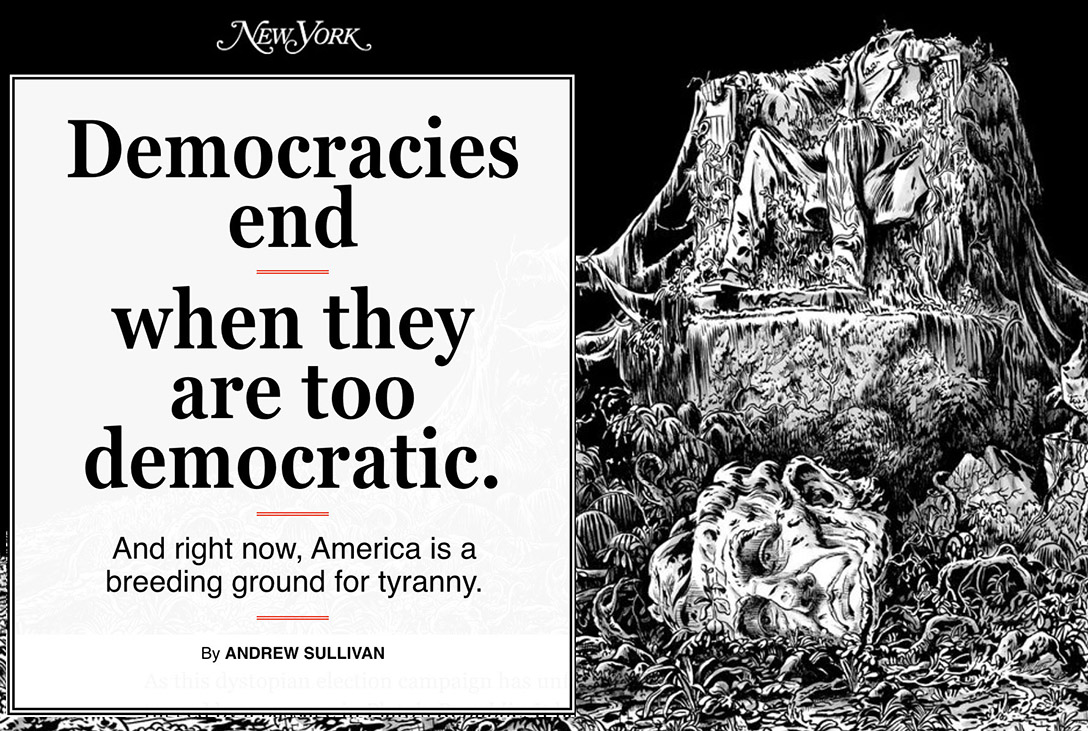
Andrew Sullivan 2016 - America Has Never Been So Ripe for Tyranny

Andrew Sullivan 2016 - America Has Never Been So Ripe for Tyranny
Socrates seemed pretty clear on one sobering point: that “tyranny is probably established out of no other regime than democracy.”Andrew Sullivan 2016
America Has Never Been So Ripe for Tyranny
Plato had planted a gnawing worry in my mind a few decades ago about the intrinsic danger of late-democratic life. It was increasingly hard not to see in Plato’s vision a murky reflection of our own hyperdemocratic times and in Trump a demagogic, tyrannical character plucked directly out of one of the first books about politics ever writtenAndrew Sullivan 2016
America Has Never Been So Ripe for Tyranny
The very fact that we retreat to moral arguments – and often moral arguments only – to justify democracy indicates that for many parts of the world the historical and social arguments supporting democracy are just not there.Robert Kaplan 1997
Was Democracy Just a Moment?
Hobbes, who lived through the debacle of parliamentary rule under Cromwell, published his translation of Thucydides in order, he said, to demonstrate how democracy, among other factors, was responsible for Athens’s decline.Robert Kaplan 1997
Was Democracy Just a Moment?
As if poverty was not miserable enough in itself, the effect of democracy adds insult to this injury. In low-income countries, democracy made the society more dangerous.Paul Collier 2009
Wars, Guns and Votes
Most people, including most Americans, would be surprised to learn that the word “democracy” does not appear in the Declaration of Independence (1776) or the Constitution of the United States of America (1789). They would also be shocked to learn the reason for this absence in the Founding documents of the U.S.A. Contrary to what propaganda has led the public to believe, America’s Founding Fathers were skeptical and anxious about democracy. They were aware of the evils that accompany a tyranny of the majority. The Framers of the Constitution went to great lengths to ensure that the federal government was not based on the mere will of the majority and that it, therefore, was not democratic.Steve H. Hanke
Democracy or Liberty?
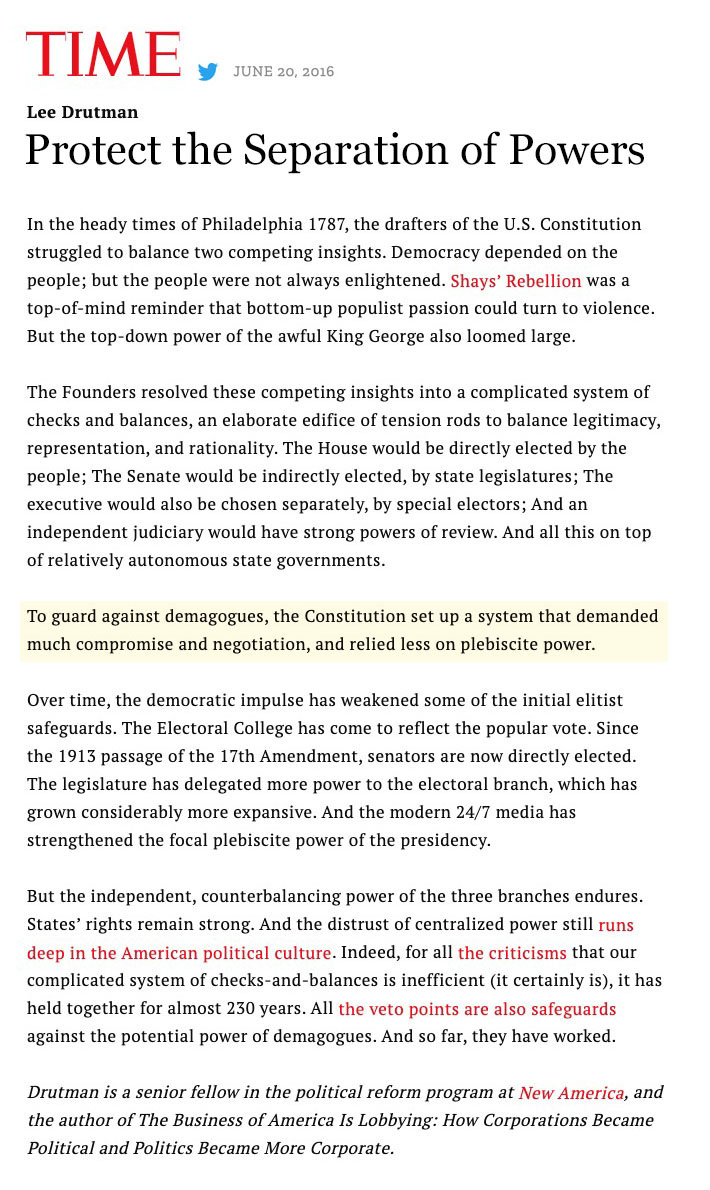
Lee Drutman 2016 - Protect the Separation of Powers

Lee Drutman 2016 - Protect the Separation of Powers
First, I want to suggest that we cannot understand how our democratic institutions are designed and how they function without recognizing that a uniquely American cultural sensibility and understanding of democracy – one that I view as excessively romantic, particularly in the forms it takes todayinforms a good deal of the ways we design and reform our democratic institutions. This uniquely romantic conception of democracy has, I believe, perversely contributed to the decline of our formal political institutions. This will be one of my themes: the dangers of democratic romanticism. Richard H. Pildes 2013
Romantacizing Democracy
He observed that the general object was to provide a cure for the evils under which the U.S. laboured; that in tracing these evils to their origin every man had found it in the turbulence and follies of democracy: that some check therefore was to be sought for agst. this tendency of our Governments: and that a good Senate seemed most likely to answer the purpose... He was for offering such a check as to keep up the balance, and to restrain, if possible, the fury of democracy... The object of this 2d. branch is to controul the democratic branch of the Natl. Legislature.James Madison Notes 1787
Constitutional Convention
The Constitution was designed to further the cause of liberty, not of democracy. To do that, the Constitution protected individuals’ rights from the government, as well as from their fellow citizens. To that end, the Constitution laid down clear, unequivocal, and enforceable rules to protect individuals’ rights, which strictly limited government’s scope and scale.Steve H. Hanke
Democracy or Liberty?
“Democracy” and “liberty” are not interchangeable words.Steve H. Hanke
Democracy or Liberty?
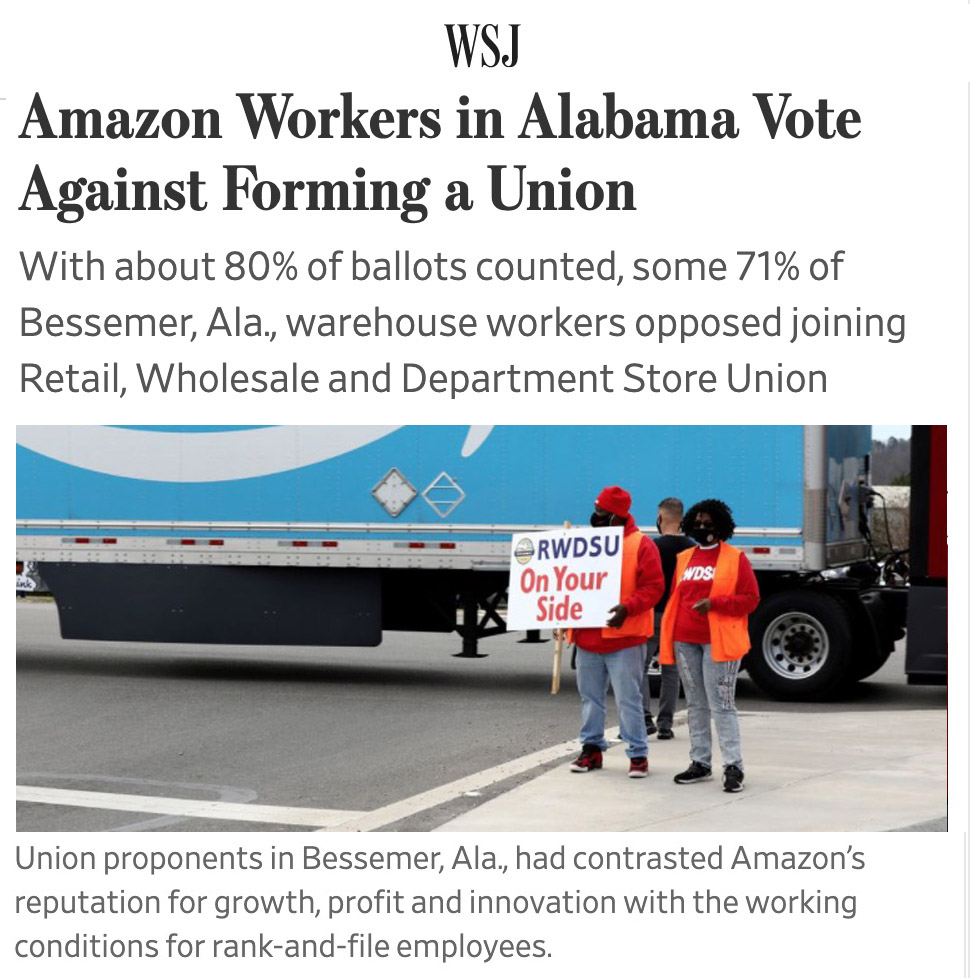
The demise of unions may be the result of increased democracy

The demise of unions may be the result of increased democracy
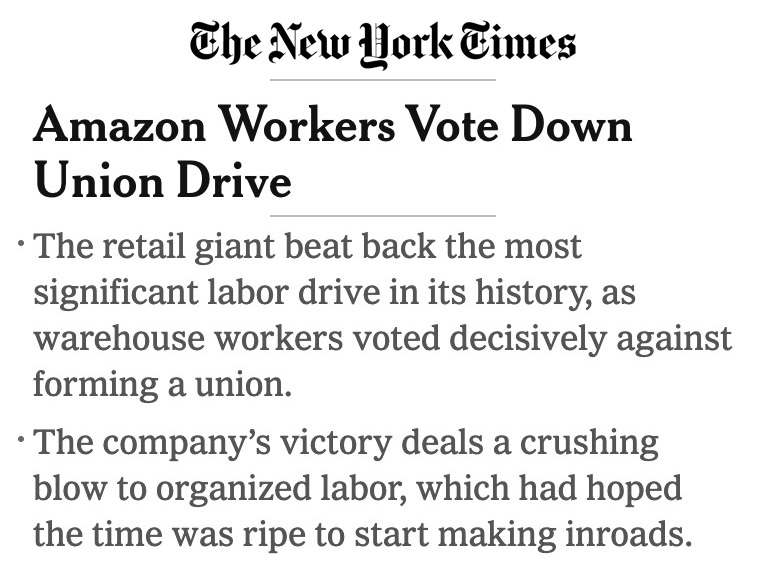
The demise of unions may be the result of increased democracy

The demise of unions may be the result of increased democracy
Invoking the word “democracy” requires great caution. It can easily result in elected tyranny.Steve H. Hanke
Democracy or Liberty?
Hamilton’s besetting fear was that American democracy would be spoiled by demagogues who would mouth populist shibboleths to conceal their despotism.Ron Chernow 2004
Alexander Hamilton
There is no compelling evidence that democracy of any sort will necessarily promote good environmental outcomes (Neumayer 2002), or that rising living standards will inevitably deliver a sustainable environment (Dinda 2004). On the contrary, there is evidence to suggest that in the initial phases at least, ‘democratisation could indirectly promote environmental degradation through its effect on national income’ (Li and Reuveny 2006, p. 953). In other words, even the best of all outcomes – rising living standards and an outbreak of democracy –may have unsustainable environmental consequences that may prove to be their undoing in the longer-term.Mark Beeson 2010
The Coming of Environmental Authoritarianism (Climate)
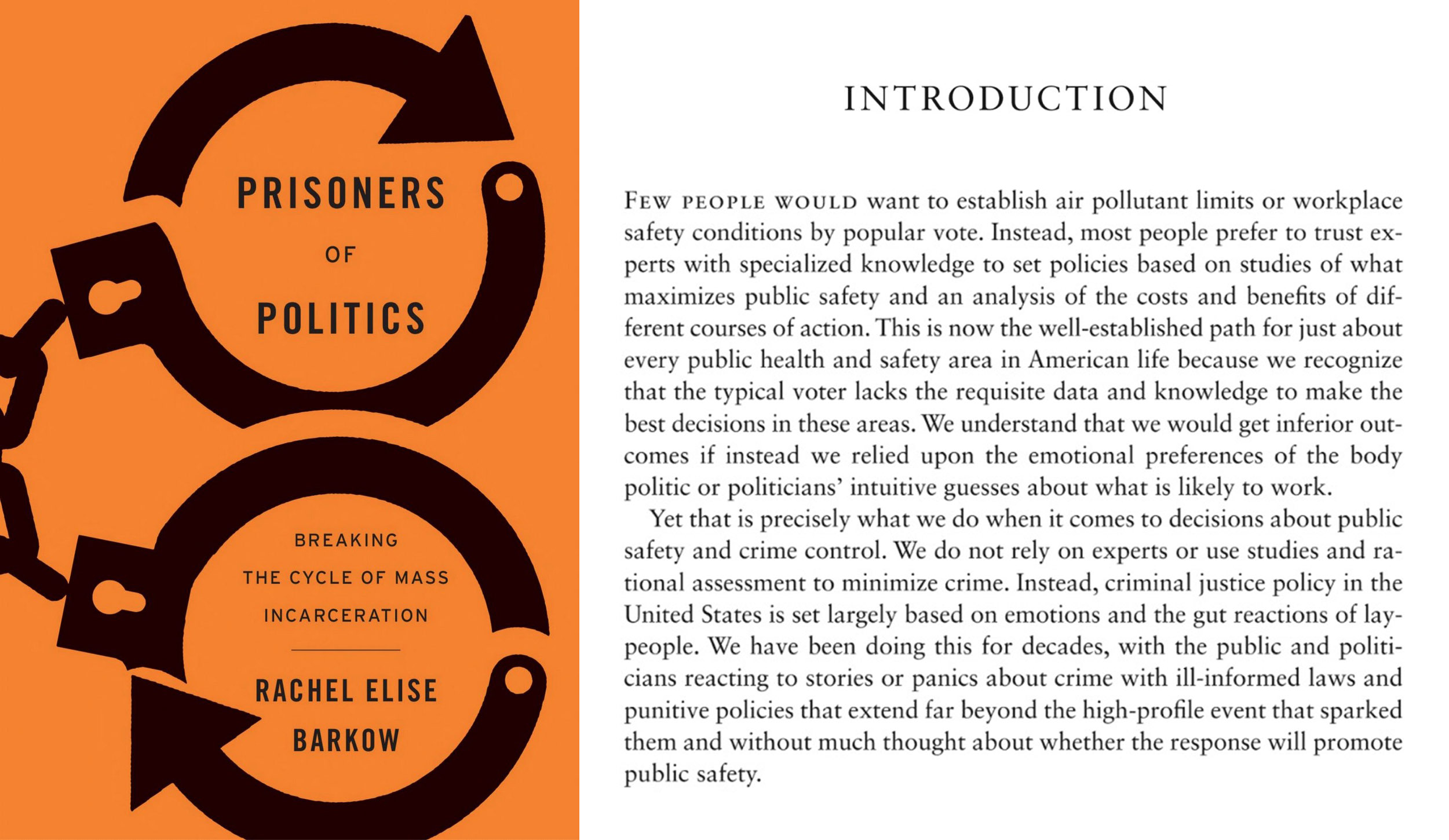
Rachel E. Barkow 2019 - Prisoners of Politics (incarceration)

Rachel E. Barkow 2019 - Prisoners of Politics (incarceration)
Few people would want to establish air pollutant limits or workplace safety conditions by popu lar vote. Instead, most people prefer to trust experts with specialized knowledge to set policies based on studies of what maximizes public safety and an analysis of the costs and benefits of different courses of action. This is now the well-established path for just about every public health and safety area in American life because we recognize that the typical voter lacks the requisite data and knowledge to make the best decisions in these areas. We understand that we would get inferior outcomes if instead we relied upon the emotional preferences of the body politic or politicians’ intuitive guesses about what is likely to work. Rachel E. Barkow 2019
Prisoners of Politics
In a democracy, malpractices are bound to occur… corrupt dealings in government services lead… to close personal associations, the men responsible for them putting their heads together and mutually supporting one another. And so it goes on, until somebody or other comes forward as the people’s champion and breaks up the cliques which are out for their own interests. This wins him the admiration of the mob, and as a result he soon finds himself entrusted with absolute power.Herodotus 430 BC
Book 3 of Histories (Overdoing Democracy)
The dispiriting reality may be that authoritarian regimes – unattractive as they may be – may even prove more capable of responding to the complex political and environmental pressures in the region than some of its democracies.Mark Beeson 2010
The Coming of Environmental Authoritarianism (Climate)
Alexander Hamilton, a distinguished lawyer, took on many famous cases out of principle. After the Revolutionary War began, the state of New York enacted harsh measures against Loyalists and British subjects. These included the Confiscation Act (1779), the Citation Act (1782), and the Trespass Act (1783). All involved the taking of property. In Hamilton’s view, these acts illustrated the inherent difference between democracy and the law. Even though the acts were widely popular, they flouted fundamental principles of property law. Hamilton carried his views into action and successfully defended — in the face of enormous public hostility — those who had property taken under those three New York State statutes.Steve H. Hanke
Democracy or Liberty?
In 1986 Museveni’s army captured the Ugandan capital of Kampala without looting a single shop; Museveni postponed elections and saw that they took place in a manner that ensured his victory. “I happen to be one of those people who do not believe in multi-party democracy,” Museveni has written. “In fact, I am totally opposed to it as far as Africa today is concerned.... If one forms a multi-party system in Uganda, a party cannot win elections unless it finds a way of dividing the ninety-four percent of the electorate [that consists of peasants], and this is where the main problem comes up: tribalism, religion, or regionalism becomes the basis for intense partisanship.” In other words, in a society that has not reached the level of development Toqueville described, a multi-party system merely hardens and institutionalizes established ethnic and regional divisions. Look at Armenia and Azerbaijan, where democratic processes brought nationalists to power upon the demise of the Soviet Union: each leader furthered his country’s slide into war.Robert Kaplan 1997
Was Democracy Just a Moment?
Almost 90 percent of state judges face some kind of popular election. Thirty-eight states put all of their judges up before the voters. It has been a long-established practice for parties and lawyers to donate to the judges who will later hear their cases, but recently the size of such donations has increased dramatically. Spending on judicial campaigns has doubled in the past decade, exceeding $200 million. That figure does not include the millions spent on outside advertising. An Ohio Supreme Court justice confessed, “I never felt so much like a hooker down by the bus station…as I did in a judicial race. Everyone interested in contributing has very specific interests. They mean to be buying a vote.” Today, judicial elections reduce state judges’ willingness to apply the law or protect rights in the face of public opposition or special interests. Recent studies demonstrate that elected judges face more political pressure and reach legal results more in keeping with local public opinion than appointed judges do. Other studies have found that elected judges disproportionately rule in favor of their campaign contributors.Jed Handelsman Shugerman 2012
The People’s CourtsNote: Shugerman’s book is just one of many that investigate the endless problems of the increased use of elections to pick judges. Previously all judges were appointed by legislatures, governors and other political actors, shielding them from special interests and the wrath of the public.
The paradox that has resulted is an obvious one. It is easily stated. Recent history suggests that when large numbers of Americans become dissatisfied with the workings of their government they call for more democracy. The more they call for more democracy, the more of it they get. And the more of it they get the more dissatisfied they become with the workings of their government. And the more they become dissatisfied with the workings of their government, the more they call for more democracy... And so it goes, the cycle endlessly repeating itself. Anthony King 1997
Running Scared
The debate about the merits of representative and direct democracy goes back to ancient times. To simplify a little, the Athenians favoured pure democracy (“people rule”, though in fact oligarchs often had the last word); the Romans chose a republic, as a “public thing”, where representatives could make trade-offs for the common good and were accountable for the sum of their achievements. America’s Founding Fathers, especially James Madison and Alexander Hamilton, backed the Romans. Indeed, in their guise of “Publius” (a Roman) in the “Federalist Papers”, Madison and Hamilton warn against the dangerous “passions” of the mob and the threat of “minority factions” (ie. special interests) seizing the democratic process. Proper democracy is far more than a perpetual ballot process. It must include deliberation, mature institutions and checks and balances such as those in the American constitution. Ironically, California imported direct democracy almost a century ago as a “safety valve” in case government should become corrupt. The process began to malfunction only relatively recently. With Proposition 13, it stopped being a valve and instead became almost the entire engine.Economist 2011
The Perils of Extreme Democracy
It is necessary to say that people are deluded and that the task of leadership is to un-delude them.James Traub 2016
It’s Time for the Elites to Rise Up Against the Ignorant Masses
Hostility Toward Democracy
Because the Framers blamed relief legislation on “democratic licentiousness,” they designed the federal government to be insulated from the populist politics that had produced such measures in the states. Thus, they opted for huge districts for congressional representatives, and indirect elections and lengthy terms in office for both senators and presidents. They also rejected, for federal legislators, instruction, mandatory rotation, and recall. In addition, they created a powerful executive armed with a veto power that could be used to block any populist economic measures that might somehow sneak through a legislature designed to squelch them. To the extent that the Framers were thinking about judicial review at all, they mostly conceived of it as another potential check on such relief legislation.
Indeed, most of the delegates to the Philadelphia convention would have preferred a constitution that shielded the federal government even more from populist pressures. Yet their choices were constrained by the role that popularly elected state ratifying conventions would play in deciding whether to approve the Constitution. To the limited extent that the Framers cared about public opinion, it was mainly because of this constraining influence of the ratifying process. It is this consideration that possibly explains their rejection of Madison’s proposal for a national veto on state legislation, which was replaced with explicit constraints on state relief measures to be enforced by judges under the Supremacy Clause. The delegates, also for this reason, agreed on significantly shorter terms in office for congressmen, senators, and presidents than most of them would have liked. Likewise, even though most of the Framers favored property qualifications for voting and officeholding, they did not impose any in the Constitution, partly because they understood that doing so would jeopardize ratification in states that had already reduced such property qualifications more than the Framers were inclined to do.Michael J. Klarman 2016
The Framers’ Coup
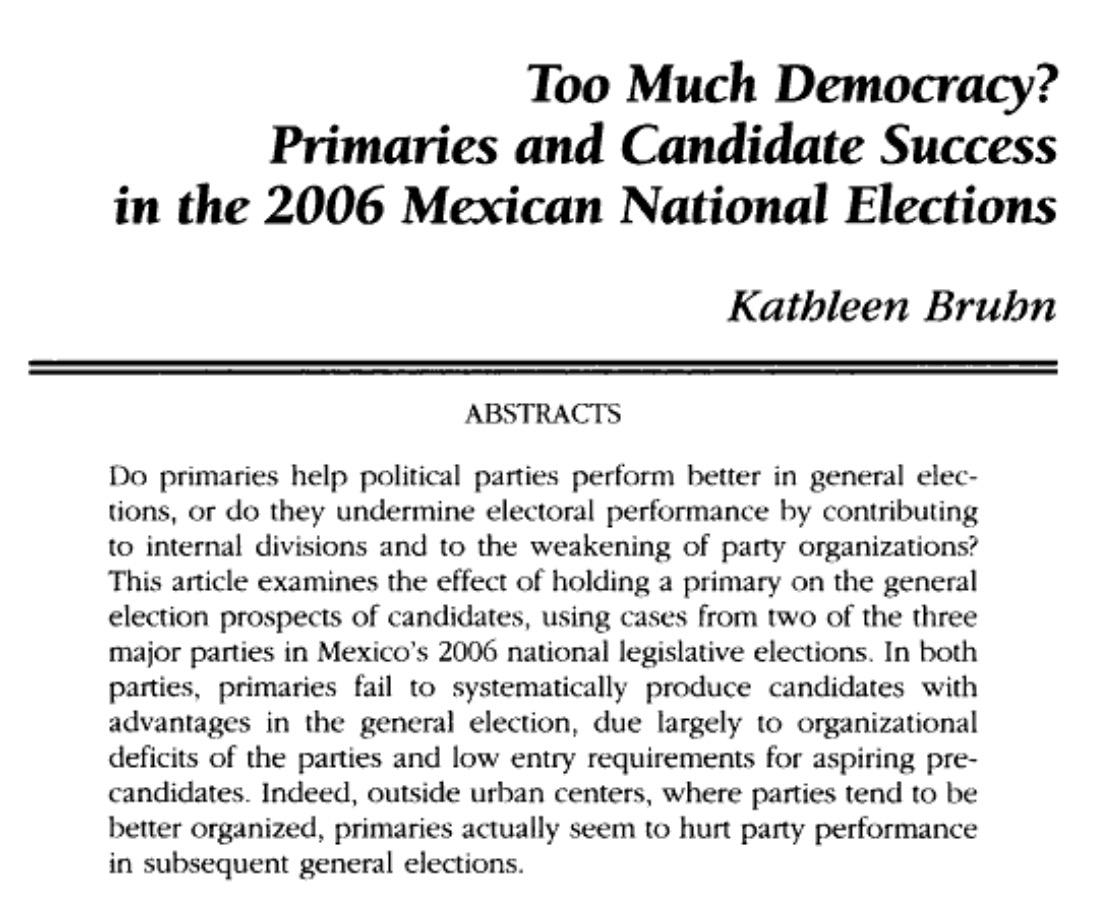
Kathleen Bruhn 2020 - Too Much Democracy?

Kathleen Bruhn 2020 - Too Much Democracy?
Carter Braxton, a Virginia political leader and signer of the Declaration of Independence, worried that these state constitutions would be “fraught with all the tumult and riot incident to simple democracy.” In the mid- 1780s, some of the worst fears of these political leaders were realizedMichael J. Klarman 2016
The Framers’ Coup
It is in vain to Say that Democracy is less vain, less proud, less selfish, less ambitious or less avaricious than Aristocracy or Monarchy. It is not true in Fact and no where appears in history. Those Passions are the same in all Men under all forms of Simple Government, and when unchecked, produce the same Effects of Fraud Violence and Cruelty. John Adams 1814
Letter to John Taylor
In the dialogues of Plato, the founding father of Greek Philosophy – Socrates – is portrayed as hugely pessimistic about the whole business of democracy. In Book Six of The Republic, Plato describes Socrates falling into conversation with a character called Adeimantus and trying to get him to see the flaws of democracy by comparing a society to a ship. If you were heading out on a journey by sea, asks Socrates, who would you ideally want deciding who was in charge of the vessel? Just anyone or people educated in the rules and demands of seafaring? The latter of course, says Adeimantus, so why then, responds Socrates, do we keep thinking that any old person should be fit to judge who should be a ruler of a country?Anonymous 2016
Why Socrates Hated Democracy
All in all, Rosenbluth and Shapiro argue, the efforts to increase voters’ direct control over political parties “turn out to be the political equivalent of bloodletting. Either they have no impact on the malady they are meant to address or—more often—they make it worse. Rebuilding well-functioning democracies means reversing this trend.”Yascha Mounk 2018
Is More Democracy Always Better Democracy?
The real-world result of democratization can be to reduce representativeness.Jonathan Rauch & Ray La Raja 2019
Too Much Democracy Is Bad for Democracy
Democracy was supposed to be the great American gift to the post-Cold War world. So it comes as no mean embarrassment that less than a decade later many find that democracy is not what it was cracked up to be. In many places, democracy is less the solution than the problem: the new problem of the illiberal content of democracy – people choosing bad things like racism and selfish power.Stephen S. Rosenfeld 1997
Democracy: The Down Side
Soft despotism gives people the illusion that they are in control, when in fact they have very little influence over their government...Soft despotism is a term coined by Alexis de Tocqueville describing the state into which a country overrun by “a network of small complicated rules” might degrade. Soft despotism is different from despotism (also called ‘hard despotism’) in the sense that it is not obvious to the people.Wikipedia 2021
Soft Despotism
Mr. Zakaria, the editor of Newsweek International, defines constitutional liberalism as the “bundle of freedoms” that include the rule of law, the rights of free speech and religion and the protection of minorities. Such freedoms, he writes, require the limitation of power, although democracy can sometimes mean the accumulation of it by an electorate that is little more than a mob. An example is his native India, where Hindu politicians pursue the “rhetoric of hatred,” which has led to “the ethnic cleansing of tens of thousands” simply because it appeals to so many anti-Muslim voters.Robert Kaplan 2003
Here’s your vote; liberty can wait
Democracy’s mixed record in producing liberty is Zakaria’s theme. He writes about Karl Lueger, the rabid anti-Semite who in 1895 was elected mayor of Vienna. The unelected Habsburg emperor, Franz Joseph I, refused to honor the election, an anti-democratic measure that furthered the cause of historic liberalism rather than impeded it. As the author shows, the rise of fascism in the first half of the 20th century was inextricable from the expansion of the democratic franchise: Hitler rose to power through a free and fair democratic election.Robert Kaplan 2003
Here’s your vote; liberty can wait
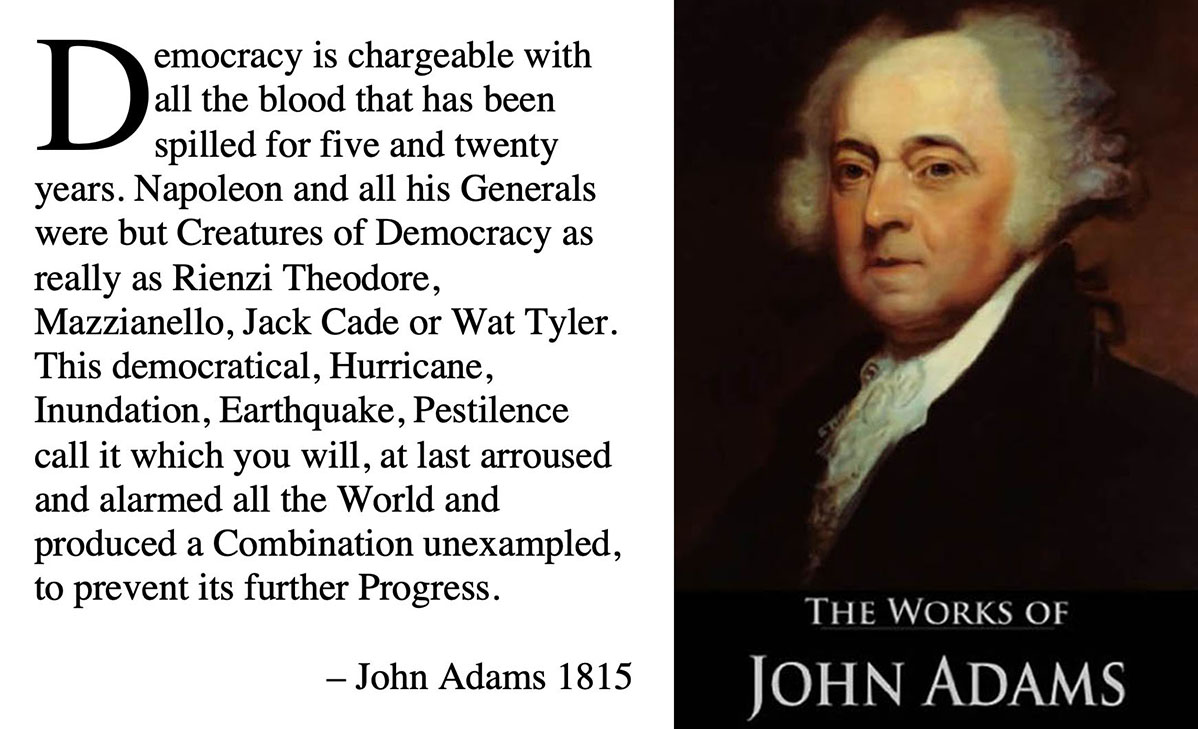
John Adams 1814 - Letter to John Taylor. Adams was perhaps history’s most ardent critic of democracy.

John Adams 1814 - Letter to John Taylor. Adams was perhaps history’s most ardent critic of democracy.
Democracy for Realists assails the romantic folk-theory at the heart of contemporary thinking about democratic politics and government, and offers a provocative alternative view grounded in the actual human nature of democratic citizens. Christopher Achen and Larry Bartels deploy a wealth of social-scientific evidence, including ingenious original analyses of topics ranging from abortion politics and budget deficits to the Great Depression and shark attacks, to show that the familiar ideal of thoughtful citizens steering the ship of state from the voting booth is fundamentally misguided. They demonstrate that voters―even those who are well informed and politically engaged―mostly choose parties and candidates on the basis of social identities and partisan loyalties, not political issues. They also show that voters adjust their policy views and even their perceptions of basic matters of fact to match those loyalties. When parties are roughly evenly matched, elections often turn on irrelevant or misleading considerations such as economic spurts or downturns beyond the incumbents' control; the outcomes are essentially random. Thus, voters do not control the course of public policy, even indirectly.Christopher Achen & Larry Bartels 2016
Democracy for Realists
Democracy is on the rise everywhere and has come to fruition in America, [Tocqueville] states. It does not need to be promoted and it cannot be opposed. Tocqueville believes that both the promoters and the opponents do more harm than good, and especially the promoters because they are more in harmony with democratic times, hence more seductive than the reactionaries. Democracy must fi rst be analyzed and assessed for its strengths and weaknesses, and then it can be usefully praised with a view to confi rming the former and counteracting the latter.Harvey Mansfield 2010
Tocqueville: A Very Short Introduction
The best argument against Democracy is a five-minute conversation with the average voter.Aphorism sometimes attributed to Winston Churchill 1955
Quora
I cannot believe that God has for several centuries been pushing two or three hundred million men toward equality just to make them wind up under a Tiberian or Claudian despotism. Verily, that wouldn’t be worth the trouble. Why He is drawing us toward democracy, I do not know; but embarked on a vessel that I did not build, I am at least trying to use it to gain the nearest port.Alexis De Tocqueville 1835
Letter to Louis de Kergorlay, January 1835. Selected Letters, p. 94.
You are a Conservative member of Congress [and like] John Adams you fear the mob because you know as he knew that a mob is not able to protect Liberty not even its own and you’re amazed at the wisdom that he and other framers had in establishing a slow deliberative governing process.Bob Inglis 2017
Conservative Climate Courage.Note: Bob Inglis was a revered Republican congressman and a presidential hopeful, until he started talking about doing something about climate change. Big oil (Tea Party) destroyed him in the primaries by running many negative ads that had nothing to do with climate. The mob (the people, his constituents) turned against him. This terrifying message reverberates still through all modern day Republican primaries - “make a move on climate change you moderate Republican and big oil - by using the anger of the people - will gun you down!”
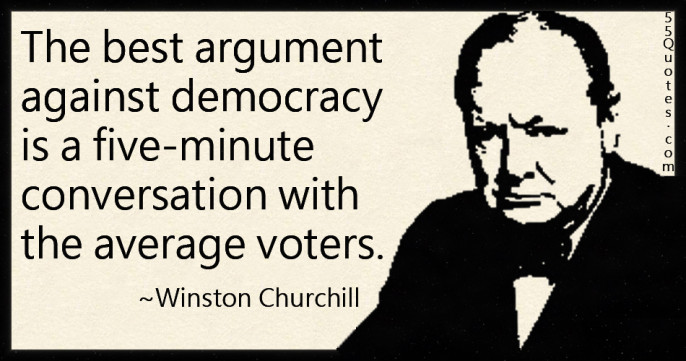
Winston Churchill

Winston Churchill
For these reasons, the majority’s government is as likely to be poorly administered as the majority is likely to be willful and undisciplined; it will often be lacking in apparent purpose and sustained effort, inexpert, and wasteful. One may suppose that democratic government will rarely be effective, efficient, or economical, even if it does not always produce tyranny. The majority itself will want to ignore its own laws and policies when inconvenienced by them or to change them hurriedly to suit its convenience and change them again according to newer convenience. This means that democracy’s elected representatives, however feckless, will always find much to do. Democratic government will have an appearance of restive, almost anarchic, activity; one will easily remark a superficial legislative and administrative instability which is especially worrisome because it reflects and aggravates democracy’s tendency to regard the formalities of government as mere inconveniences.Harvey Mansfield & Delba Winthrop 2000
Tocqueville: Democracy in America
I loathed and feared that dictatorship because of its policies, and also for personal reasons: especially because of the things that it did to many of my New Guinea friends, and because of its soldiers almost killing me. I was therefore surprised to find that that dictatorship set up a comprehensive and effective national park system in Indonesian New Guinea. I arrived in Indonesian New Guinea after years of experience in the democracy of Papua New Guinea, and I expected to find environmental policies much more advanced under the virtuous democracy than under the evil dictatorship. Instead, I had to acknowledge that the reverse was true.Jared Diamond 2005
Collapse
Curry criticizes citizen-participation processes for allowing special-interest views to dominate the decision making: “A number of aspiring CP participant groups were clearly not acting in a representative capacity, or even perceiving themselves to be, and some had an openly declared intent to pursue vested interests.” Because citizen participants are not paid for their time, committees may be dominated by strongly partisan participants whose livelihood or values are strongly affected by the decisions being made, or by those who live comfortably enough to allow them to participate regularly. Smith and McDonough provide distressing evidence from their study of 53 focus groups that citizen participants recognized inequality in the representation and resented what they saw as an unfair public participatory process. Citizens were not at all satisfied with the process: “...some of the meetings I quit going to because they were loaded and they were orchestrated, so why attend when you knew the outcome was gonna be what they wanted....”Renee Irvin & John Stansbury
Citizen Participation in Decision Making: Is It Worth the Effort?
“Public” opinion takes opinion out of private society and places it in broad daylight, to use one of Tocqueville’s favorite phrases. Public and private are blurred together, and it becomes clear that democracy is government by public opinion. Private opinion – in the sense of what might be reserved to oneself against what most people think – tends to disappear; it proves to have required an aristocratic social state in which independent nobles had the standing to say what they pleased. This shows us why Tocqueville puts little trust in the power of representative institutions to hold out against the people’s desires: public opinion makes the people’s representatives conform to their desires regardless of the apparent latitude that representative offices with constitutional terms might seem to afford. He would have seen the public opinion polls of our day as vivid confirmation, with the aid of science, of the trend he saw already in his day.Harvey Mansfield & Delba Winthrop 2000
Tocqueville: Democracy in America
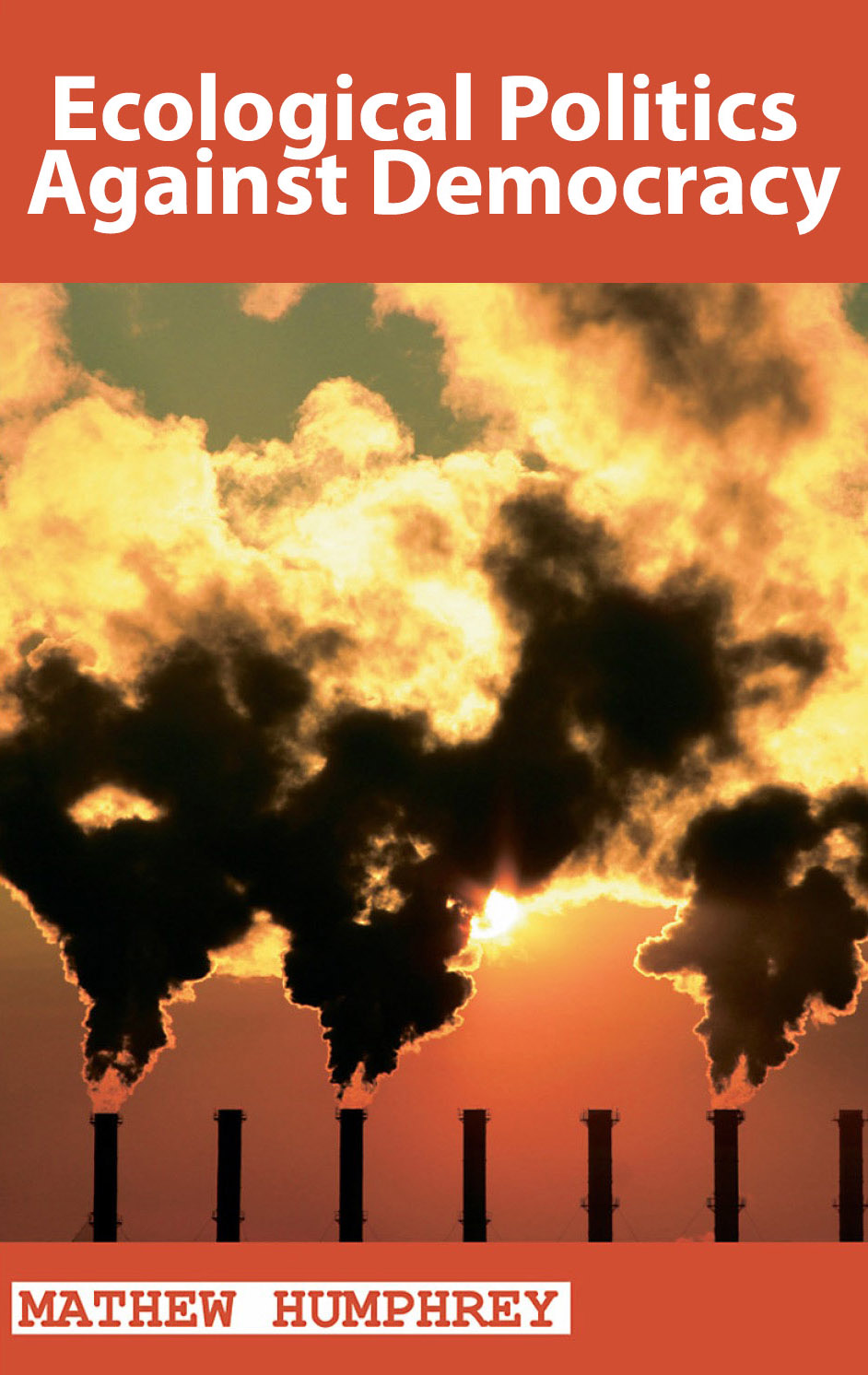
Humphrey 2007 Ecological Politics Against Democracy (Climate)

Humphrey 2007 Ecological Politics Against Democracy (Climate)
Can democracy deliver the policies that greens want to see? If it cannot, how should environmentalists respond? Should they stoically accept defeat or reject democracy and look for an alternative form of government? Ecological Politics and Democratic Theory examines the reasons why some despair at the prospects for an ecological form of democracy, and challenges the recent ‘deliberative turn’ in environmental political thought. Deliberative democracy has become popular for those seeking a reconciliation of these two forms of politics. Demand for equal access to a public forum in which the best argument will prevail appears to offer a way of incorporating environmental interests into the democratic process. This book argues that deliberative theory [overt democracy], far from being friendly to the environmental movement, shackles the ability of those seeking radical change to make their voices heard in the most effective manner.Mathew Humphrey 2007
Ecological Politics and Democratic Theory - The Challenge to the Deliberative Ideal (Climate)
Environmentally friendly policies can be justifiably imposed upon a population that ‘would do something quite different if it was merely left to its own immediate desires and devices’ (Ophuls, 1977: 227): currently left to these devices, the American people ‘have so far evinced little willingness to make even minor sacrifices... for the sake of environmental goals’ (Ophuls, 1977: 197). Laura Westra makes a similar argument in relation to the collapse of Canadian cod fisheries, which is taken to illustrate a wider point that we cannot hope to ‘manage’ nature when powerful economic and political interests are supported by ‘uneducated democratic preferences and values’(Westra, 1998: 95). More generally reducing our ‘ecological footprint’ means ‘individual and aggregate restraints the like of which have not been seen in most of the northwestern world. For this reason, it is doubtful that persons will freely embrace the choices that would severely curtail their usual freedoms and rights... even in the interests of long-term health and self-preservation’ (Westra, 1998: 198). Thus we will require a ‘top-down’ regulatory regime to take on ‘the role of the “wise man” of Aristotelian doctrine’ as well as ‘bottom-up’ shifts in values (Westra, 1998: 199). Ophuls also believes that in certain circumstances (of which ecological crisis is an example) ‘democracy must give way to elite rule’ (1977: 159) as critical decisions have to be made by competent people.Mathew Humphrey 2007
Ecological Politics and Democratic Theory - The Challenge to the Deliberative Ideal (Climate)
For Plato, democracy—the rule of the masses—and oligarchy—the rule of the rich—were dangerous because these were forms of government motivated by self-interest, lacking a higher purpose. They were also unstable, almost always degrading into the worst kind of regime, tyranny.Fareed Zakaria 2020
Ten Lessons for a Post-Pandemic World
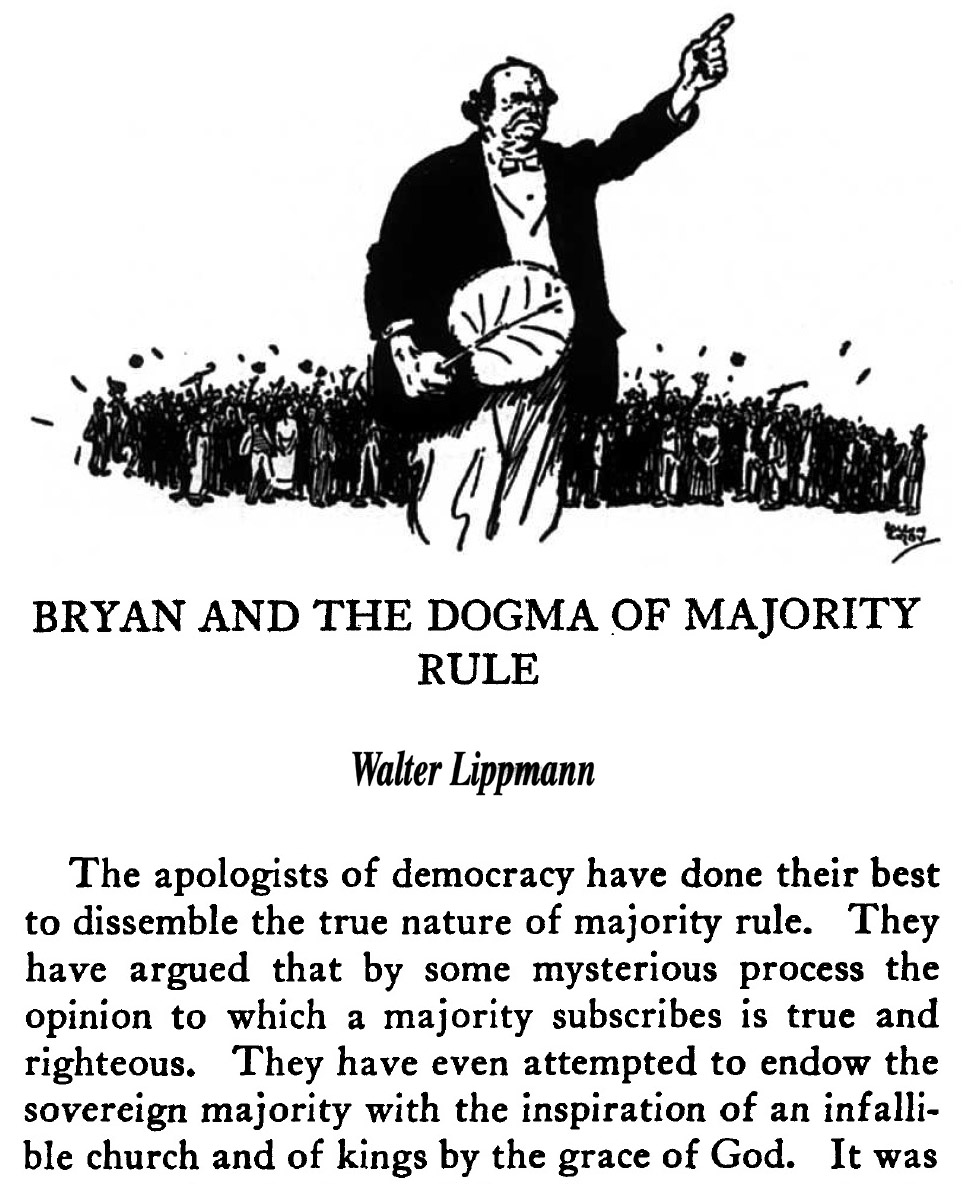
Walter Lippman 1927 - Bryan and the Dogma of Majority Rule

Walter Lippman 1927 - Bryan and the Dogma of Majority Rule
There is nothing in the teachings of Jesus or St. Francis which justifies us in thinking that the opinions of fifty-one percent of a group are better than the opinions of forty-nine percent. The mystical doctrine of equality ignores the standards of the world and recognizes each soul as unique; the principle of majority rule is a device for establishing standards of action in this world by the crude and obvious device of adding up voters.Walter Lippman 1927
Bryan and the Dogma of Majority Rule
The rule of the majority is the rule of force. For while nobody can seriously maintain that the greatest number must have the greatest wisdom or the greatest virtue, there is no denying that under modern social conditions they are likely to have the most power. Walter Lippman 1927
Men of Destiny
The apologists of democracy have done their best to dissemble the true nature of majority rule. They have argued that by some mysterious process the opinion to which a majority subscribes is true and righteous. They have even attempted to endow the sovereign majority with the inspiration of an infallible church and of kings by the grace of God.Walter Lippman 1927
Bryan and the Dogma of Majority Rule
Yet the historic record plainly shows that the progress of democracy has consisted in an increasing participation of an increasing number of people in the management of institutions they neither created nor willed. And the record shows, too, that new numbers were allowed to participate when they were powerful enough to force their way in; they were enfranchised not because “society” sought the benefits of their wisdom, and not because “society” wished them to have power; they were enfranchised because they had power, and giving them the vote was the least disturbing way of letting them exercise their power. For the principle of majority rule is the mildest form in which the force of numbers can be exercised. It is a pacific substitute for civil war in which the opposing armies are counted and the victory is awarded to the larger before any blood is shed.Walter Lippman 1926
Bryan and the Dogma of Majority Rule
It would be as unnatural to refer the choice of a proper character for chief magistrate [the president] to the people, as it would be to refer a trial of colors to a blind man.George Mason 1787
Constitutional Convention
Earnest and able democratic citizens will often lack the time to choose representatives wisely... Moreover, well-meaning but untutored, unsure, or merely busy, citizens can easily be led astray by political partisans; and in a democracy, they tend to be swayed by partisans who advocate the unlimited expansion of popular power. Democratic citizens will constantly be urged, and tempted, to press for increasing the power of the majority without being able to assure its wisdom or justice.Harvey Mansfield & Delba Winthrop 2000
Tocqueville: Democracy in America
In a footnote to his discussion of majority tyranny [Tocqueville’s primary critique of democracy], Tocqueville gives two examples of it: in Baltimore, two journalists who opposed the War of 1812 were killed by a mob of supporters of the war; and in Philadelphia, black freedmen were invariably too intimidated to exercise their right to vote.Harvey Mansfield & Delba Winthrop 2000
Tocqueville: Democracy in America
In the narrower sense, Tocqueville looks at what the [democratic] unfettered will of the American people – in effect, the white or “Anglo-American” majority – had thus far wrought, for good and ill, including the most egregious examples of its tyranny: virtual extermination of the Indians and enslavement of blacks. Tocqueville calls this [democratic] tyranny, and he shows its effects on the tyrant as well as on its victims. In the broader sense, one can see more clearly how the seed of tyranny, “the right and the ability to do everything,” germinates especially in modern peoples. Modern philosophy posits that there are in principle no limits on human will – for that is one meaning of the sovereignty of the people – and the political forms of modern democracy are inadequate to contain a people’s willfulness. Harvey Mansfield & Delba Winthrop 2000
Tocqueville: Democracy in America
Mankind will in time discover that unbridled majorities are as tyrannical and cruel as unlimited despots.John Adams 1793
Comments on the French Revolution
But I consider it right as a citizen to set the welfare of the state above the popularity of an orator. Indeed, I am given to understand – and so perhaps are you – that the orators of past generations, always praised but not always imitated by those who address you, adopted this very standard and principle of statesmanship. I refer to the famous Aristides, to Nicias, to my own namesake, and to Pericles. But ever since this breed of orators appeared who ply you with such questions as “What would you like? What shall I propose? How can I oblige you?” the interests of the state have been frittered away for a momentary popularity.The natural consequences follow, and the orators profit by your disgrace.Demosthenes 322 BC
Third Olynthiac
We must realize that it is very hard to save a civilization when its hour has come to fall beneath the power of demagogues. For the demagogue has been the great strangler of civilization. Both Greek and Roman civilizations fell at the hands of this loathsome creature who brought from Macaulay the remark that “in every century the vilest examples of human nature have been among the demagogues.” But a man is not a demagogue simply because he stands up and shouts at the crowd.There are times when this can be a hallowed office.The real demagogy of the demagogue is in his mind and is rooted in his irresponsibility towards the ideas that he handles—ideas not of his own creation, but which he has only taken over from their true creators. Demagogy is a form of intellectual degeneration.José Ortega y Gasset 1962
History as a System
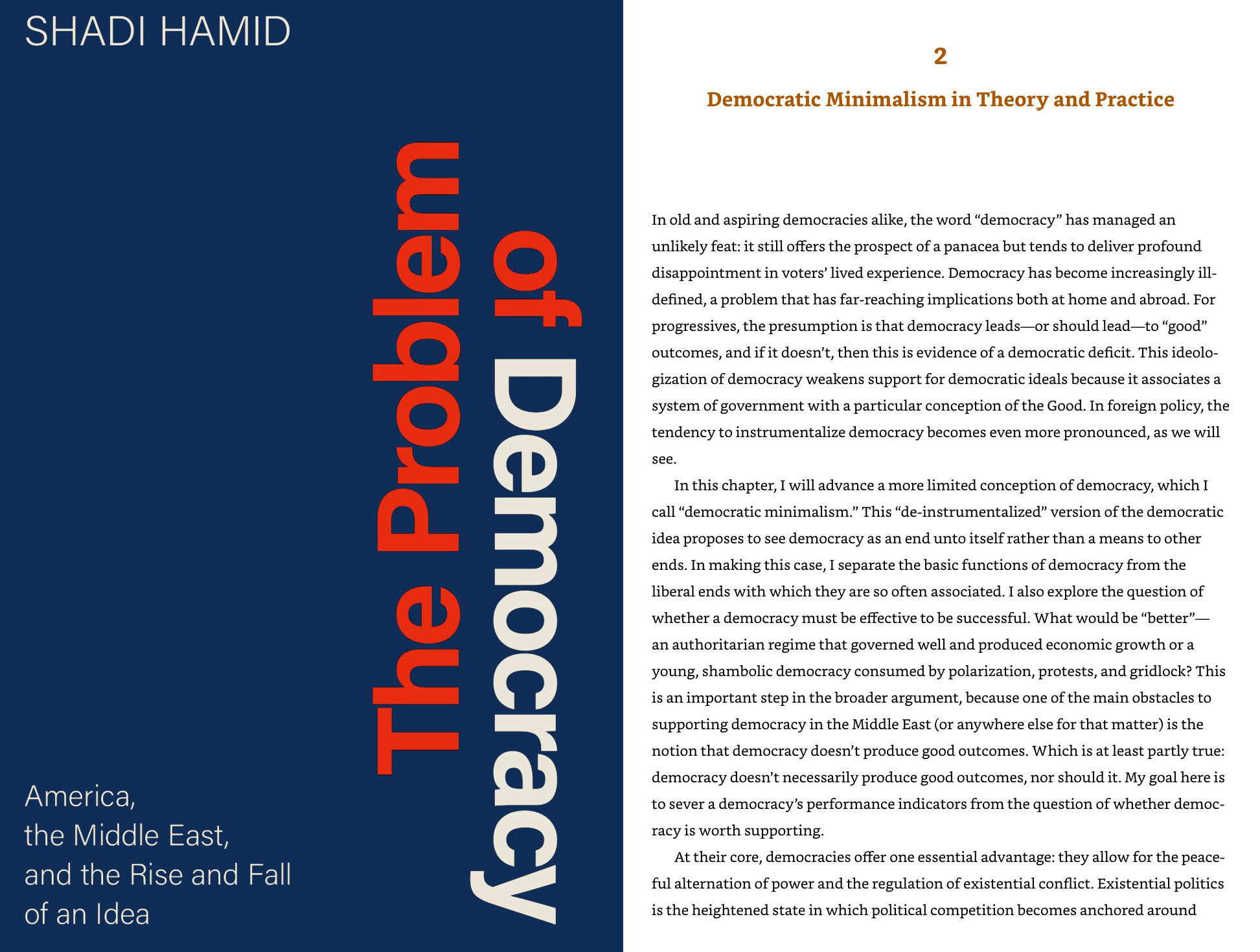
Shadi Hamid 2022 - The Problem of Democracy

Shadi Hamid 2022 - The Problem of Democracy
One of the main obstacles to supporting democracy in the Middle East (or anywhere else for that matter) is the notion that democracy doesn’t produce good outcomes. Which is at least partly true: democracy doesn’t necessarily produce good outcomes, nor should it.Shadi Hamid 2023
The Problem of Democracy
In theory, democracy is a bulwark against socially harmful policies. In practice, however, democracies frequently adopt and maintain policies that are damaging. How can this paradox be explained? The influence of special interests and voter ignorance are two leading explanations...The central idea is that voters are worse than ignorant; they are, in a word, irrational – and they vote accordingly. Despite their lack of knowledge, voters are not humble agnostics; instead, they confidently embrace a long list of misconceptions.Bryan Caplan 2007
The Myth of the Rational Voter
Jacksonian-era reforms have bequeathed us the world’s only elected judges and prosecutors. Indeed, we elect more than 5oo,ooo legislative and executive figures, vastly more than any other country per capita (one elected official for every 485 persons): we elect insurance commissioners, drainage commissioners, hospital boards, community college boards, local school boards, and on and on. Furthermore, we lack independent institutions to oversee the election process, such as specialized electoral courts, independent boundary-drawing commissions, and independent agencies – institutions common in most democratic countries. This leaves partisan, elected, and mostly local officials in control of much of the regulation and administration of the electoral process out of a perverse belief that doing so makes the process more democratically accountable to “us.”Richard H. Pildes 2013
Romantacizing Democracy

John F. Kennedy 1940 - Why England Slept

John F. Kennedy 1940 - Why England Slept
I say, therefore, that democracy’s weaknesses are great in competing with a totalitarian system. Democracy is the superior form of government, because it is based on a respect for man as a reasonable being. For the long run, then, democracy is superior. But for the short run, democracy has great weaknesses. When it competes with a system of government which cares nothing for permanency, a system built primarily for war, democracy, which is built primarily for peace, is at a disadvantage. And democracy must recognize its weaknesses; it must learn to safeguard its institutions if it hopes to survive.John F. Kennedy 1940
Why England SleptNote from book cover: Written when John F. Kennedy was a senior at Harvard and published in 1940, Why England Slept is a brilliant appraisal of the tragic events of the thirties that led to World War II: it is an electrifying account of England's unpreparedness for war and a sober and serious study of the shortcomings of democracy when confronted by the menace of totalitarianism.
The political stability of Costa Rica… is in part due to the fact that the country has “closed” party lists, which insure that legislators get reëlected only if they stay close to the Party’s platform. Many other Latin American countries, by contrast, have “open” party lists, which allow legislators to take their case directly to the voters—thus giving them an incentive to command media coverage, or to demand local pork in return for supporting the government. Yascha Mounk 2018
Is More Democracy Always Better Democracy?
A number of the most successful modern states were created under authoritarian conditions, often by countries facing severe national security threats. This is true of ancient China, Prussia/Germany, modern Japan, and a handful of other countries. By contrast, when democracy is introduced prior to the consolidation of a modern state, it often has the effect of weakening the quality of government. The prime example of this is the United States, which invented clientelistic party government after the opening up of the democratic franchise in the 1820s and was thereafter saddled with a patronage-riddled bureaucracy for much of the next century.Francis Fukuyama 2014
Political Order and Political Decay
The experience with many referendums on fundamentally important public issues in California suggests that either voters are not very competent to make such choices in their own interest or they are manipulated into making choices they would not make if they were adequately well informed (Gerber et al. 2001). While supposedly attempting to accomplish very different things, they have voted de facto to end California participation in national party nominating conventions and to sentence to a minimum of twenty years in prison certain of those who commit trivial crimes (petty felonies, such as stealing a carton of cigarettes or a single slice of pizza).Russell Hardin 2007
The Economics of Transparency in Politics
A good deal of traditional democratic theory leads us to expect more from national elections than they can possibly provide. We expect elections to reveal the “will” or the preferences of a majority on a set of issues. This is one thing elections rarely do, except in an almost trivial fashion.Robert A. Dahl 1956
A Preface to Democratic Theory
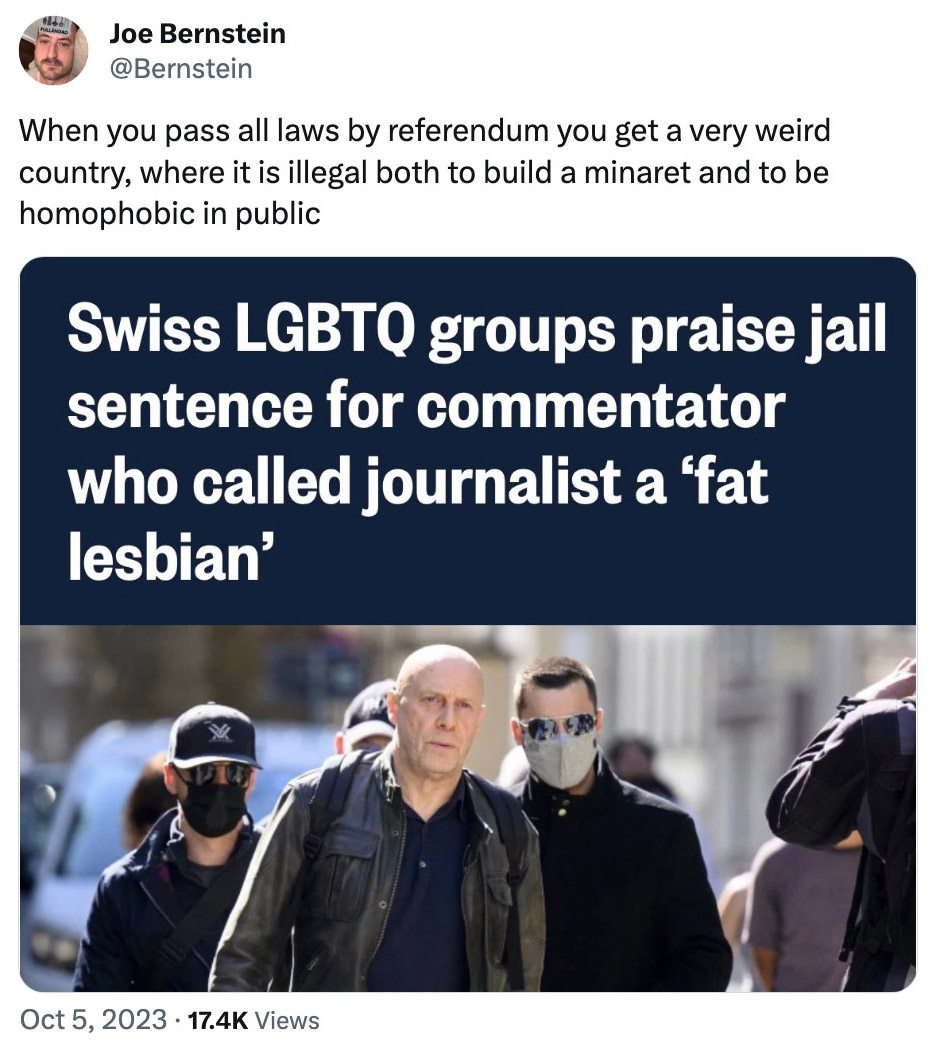
Joe Bernstein 2023 - Referenda and Initiatives Drive Populism

Joe Bernstein 2023 - Referenda and Initiatives Drive Populism
The direct primary represented an unprecedented attempt to impose the folk theory of democracy on the nominating process. InAchen and Bartels 2016
Democracy for Realists
Critics of the magistrates are also responsible. Their argument is, “The people ought to decide”: the people accept that invitation readily; and thus the authority of all the magistrates is undermined.Aristotle 400BC
The Politics
Many of my colleagues in the newspaper business have leaped to the conclusion that all public affairs, not directly connected with national defense, must be conducted in the open… I disagree. I think that much of the important business in a Republican form of government will be carried on behind closed doors. I see few dangers in that. I see many advantages. For it is only behind closed doors … that most politicians – yea, even statesmen – honestly express their views and try to get at the meat of the question. I don't mean to imply that legislative voting should not be in the open, nor that the public should be denied the right to app ear before all committees, nor that any legislator should be excused from explaining why he voted as he did. But I do mean that… in the National Capitol, the White House, and various Washington departments no sound policy is decided upon without frank exchange of views. And a frank exchange of views is rarely reached with the public and the press looking over the shoulders of the policy makers. The Government of Athens was an absolute and complete democracy, with all deliberations carried on in a goldfish howl of open debate. But Athens became smothered with oratory, paralyzed with demagoguery, and finally wound up with such an unstable mobocracy that nearly every able Athenian was banished from the land.Jenkin Lloyd Jones 1957
The Executive’s Right of PrivacyNote: remarks of Jenkin LIoyd Jones, formerly President of the American Society of Newspaper Editors, quoted in Rogers, Constitutional Law: The Papers of the Executive Branch, 44 A.B.A.J. 941, 942 (1958)
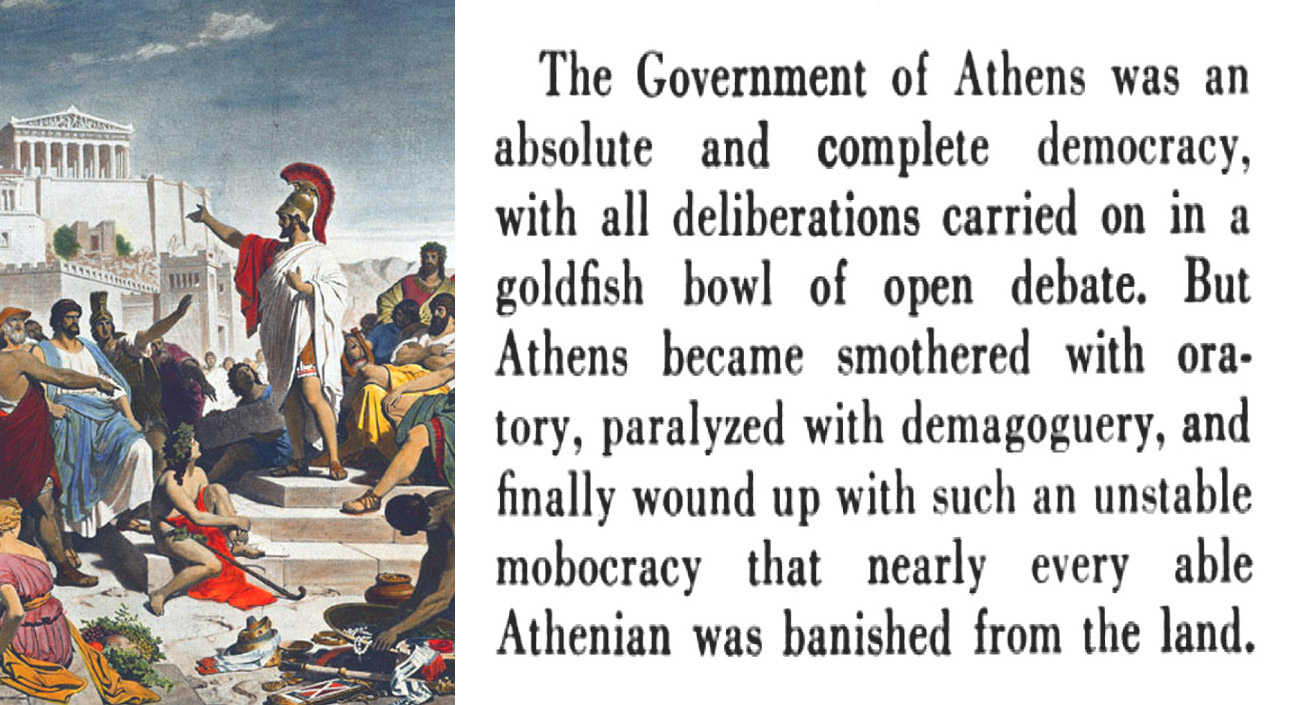
Jenkin Lloyd Jones 1957 on the failure of Greek transparency
Note: remarks of Jenkin LIoyd Jones, formerly President of the American Society of Newspaper Editors, quoted in Rogers, Constitutional Law: The Papers of the Executive Branch, 44 A.B.A.J. 941, 942 (1958)

Jenkin Lloyd Jones 1957 on the failure of Greek transparency
They will be simple democracies, of all governments the worst, and will end as all other democracies have, in despotism.Charles Carroll 1776
American Cicero
Some will find that at bottom I do not like democracy.Alexis De Tocqueville 1835
Democracy in America
In 1998, state trial court judges sentenced nearly one million U.S. residents to over two million years behind bars. In 39 states these trial court judges are elected. The “near consensus among legal scholars” says in one study is that the process of electing judges is “...insidious in its potential for compromising judicial independence.”Gary Hunter 2009
Elected Judges More Punitive Just Before Elections
The net effect of democracy on growth performance cross-nationally over the last five decades is negative or null.John Gerring, Philip Bond 2005
Democracy and Economic Growth
The majority... often has the tastes and instincts of a despot.Alexis de Tocqueville 1835
Democracy in America
Aristotle tells us, the well ordered regimes are monarchy, aristocracy and what he calls polity, rule of the one, the few, and the many, and on the corrupt side are tyranny, oligarchy and democracy.Steven Smith (Yale) 2006
Intro to Political Philosophy
What bothers Socrates most about our democracy is a certain kind of instability, its tendency to be pulled between extremes of anarchy, between lawlessness and tyranny.Steven Smith (Yale) 2006
Intro to Political Philosophy
Demagogues have been a problem for democracy for 25 centuries, at least since the populist Cleon persuaded his fellow Athenians to slaughter every man in the city of Mytilene as punishment for a failed revolt. Of that particular demagogue, Aristotle wrote: “He was the first who shouted on the public platform, who used abusive language, and who spoke with his cloak girt around him, while all the others used to speak in proper dress and manner.”Philip Freeman 2016
What History Teaches Us About Demagogues
Theoretically the United States is a republic, for the Constitution is essentially a republican instrument, but in practice our government has been growing more and more democratic. This evolution, which most of us regard either with favor or complacency, has been almost wholly deterimental to the quality of our government and consequently injurious to the development of civilization.A. Washington Pezet 1924
The New Despotism
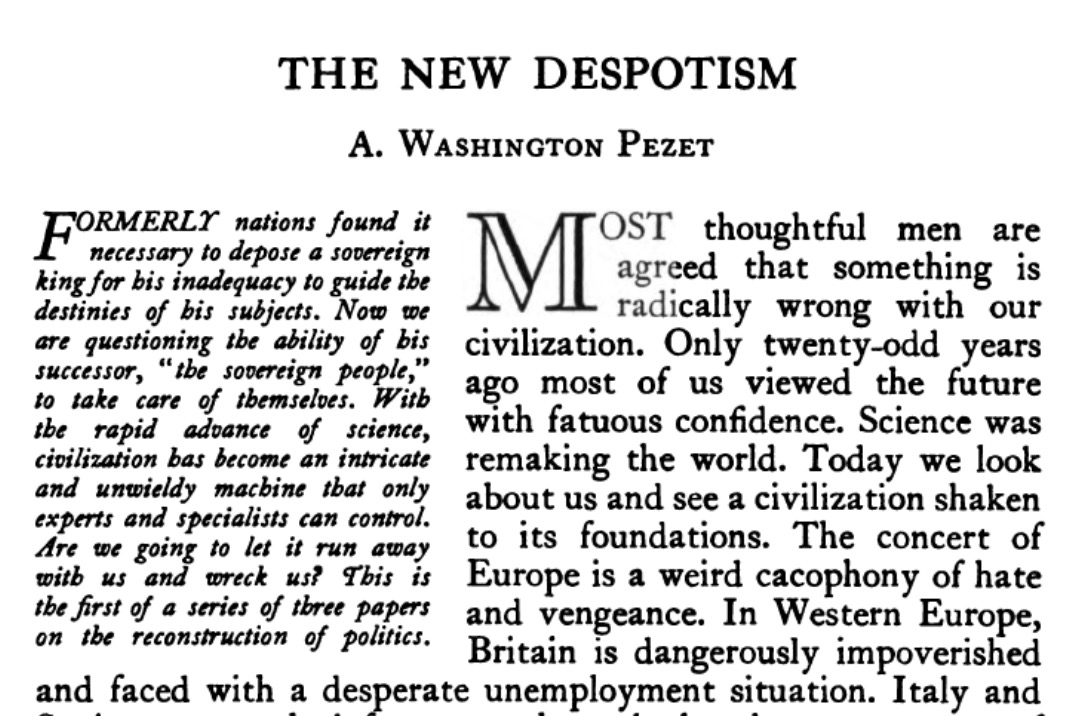
A. Washington Pezet 1924 - The New Despotism

A. Washington Pezet 1924 - The New Despotism
The really great men who wrote the Constitution were keenly alive to the perils of this theoretical democracy. They had had experience with it in those turbulent years between 1776 and 1787. And in the Constitution they drew up, they sought to avoid anything that smacked of the nebulous vagaries of democracy. In the words of one of them, Mr. Randolph of Virginia, the purpose of the Constitution “was to provide a cure” for evils whose origin could be traced to “the tribulations and follies of democracy…”A. Washington Pezet 1924
Constitution Versus Declaration
It is quixotically assumed that human nature in masses is something altogether different from human nature in those individual human units which make up human masses; that whereas an individual king may be selfish, stupid, and ignorant, a mass of selfish, stupid, and ignorant individuals will by some miracle be converted into an unselfish, intelligent, and well-informed public opinion.
It is all myth-making and delusion! There is no “The People.” It is an invention of the politicians and of the new demagogues who speak through their newspapers. There is but a mass of people, – that is, a mass of utterly present-minded and inevitably selfish individuals. What moves them “is not thought but emotion. And what sets emotion going is self-interest.” Today, as of yore, this mass is governed by the courtiers and sycophants who hem about the majesty of the sovereign, whether we call him king or people.A. Washington Pezet 1924
The New Despotism
From the perspective of the antidemocratic tradition, today’s idealization of democracy is itself remarkable. This tradition began with the history of the world’s first democracy, ancient Athens. The failures and excesses of the Athenians, particularly their oppressive imperial rule over other Greek cities, and their near-destruction after the Peloponnesian War with Sparta, seemingly validated the dangers of radical popular rule. This criticism set the tone for subsequent political philosophers, giving point to historian J. S. McClelland’s observation, “It could almost be said that political theorizing was invented to show that democracy, the rule of men by themselves, necessarily turns into rule by the mob.”Bruce Thornton 2014
Democracy’s Dangers and Discontents
With the advent of Andrew Jackson there began the steady encroachment of democratic practices. Today, in spite of our republican Constitution, we are subject to all those ills of democracy which the Founders foresaw and sought to avoid in the government they created.A. Washington Pezet 1924
Constitution Versus Declaration
Demagogues play to popular prejudices and misinformation. There’s little democracies can do to stop them, other than grant elites significant control over the process. Education, information, and political deliberation haven’t done (and won’t do) the trick.Jason Brennan 2016
What History Teaches Us About Demagogues
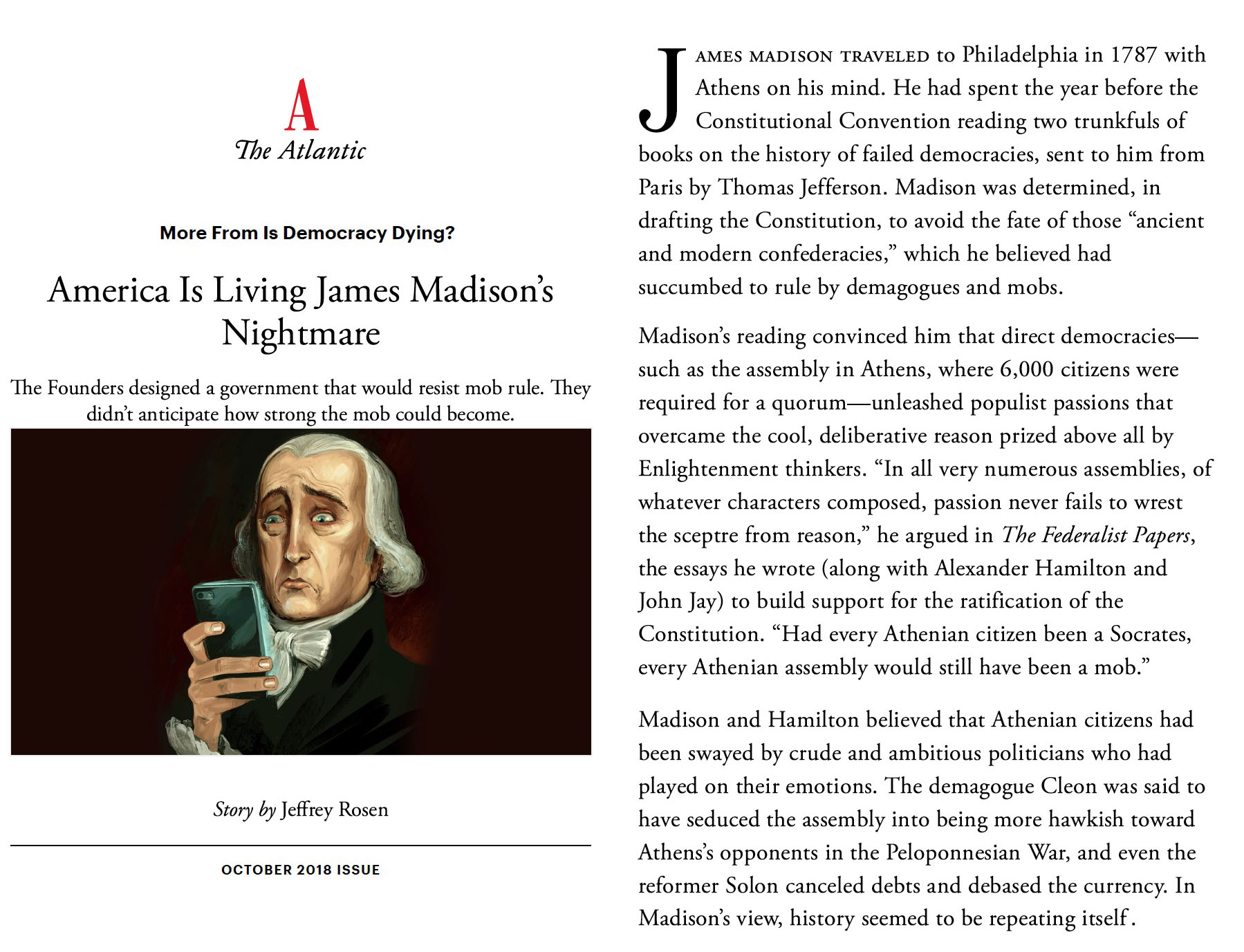
Jeffery Rosen 2018 - America Is Living James Madison’s Nightmare

Jeffery Rosen 2018 - America Is Living James Madison’s Nightmare
James madison traveled to Philadelphia in 1787 with Athens on his mind. He had spent the year before the Constitutional Convention reading two trunkfuls of books on the history of failed democracies, sent to him from Paris by Thomas Jefferson. Madison was determined, in drafting the Constitution, to avoid the fate of those “ancient and modern confederacies,” which he believed had succumbed to rule by demagogues and mobs.Jeffery Rosen 2018
America Is Living James Madison’s Nightmare
Many supporters of democracy decry the power of elites. They should be careful what they wish for. Donald Trump is what happens when we the people get what we want.Jason Brennan 2016
What History Teaches Us About Demagogues
But like any broad transformation, democracy has its dark sides. Yet we rarely speak about them. To do so would be to provoke instant criticism that you are “out of sync” with the times. But this means that we never really stop to understand these times. Silenced by fears of being branded “antidemocratic” we have no way to understand what might be troubling about the ever-increasing democratization of our lives.Fareed Zakaria 2003
Future of Freedom
Americans in particular have trouble seeing any tension between democracy and liberty because it is not a dominant theme in our own history – with one huge exception. Slavery and segregation were entrenched in the American South through the democratic system. From the founding of the republic, those who abhorred slavery faced the problem that the majority of southern voters defended it passionately. In the end, slavery died not because it was lost in a vote but because the forces of the North crushed the South. Eventually the Jim Crow system that succeeded slavery in the South was destroyed during the 1950s and 1960s not by democracy but despite it. Although the final act of emancipation, the Civil Rights Act of 1964, was passed by Congress, all previous progress took place through the executive branch’s fiat – as with the desegregation of the armed forces – or the Supreme Court’s writ – as with school desegregation. In America's greatest tragedy, liberty and democracy were often at odds.Fareed Zakaria 2003
Future of Freedom
This book is a call for self-control, for a restoration of balance between democracy and liberty. It is not an argument against democracy. But it is a claim that there can be such a thing as too much democracy – too much of an emphatically good thing.Fareed Zakaria 2003
Future of Freedom
Across the globe, democratically elected regimes, often ones that have been re-elected or reaffirmed through referenda, are routinely ignoring constitutional limits on their power and depriving their citizens of basic rights. This disturbing phenomenon – visible from Peru to the Palestinian territories, from Ghana to Venezuela – could be called “illiberal democracy.” Fareed Zakaria 2003
Future of Freedom
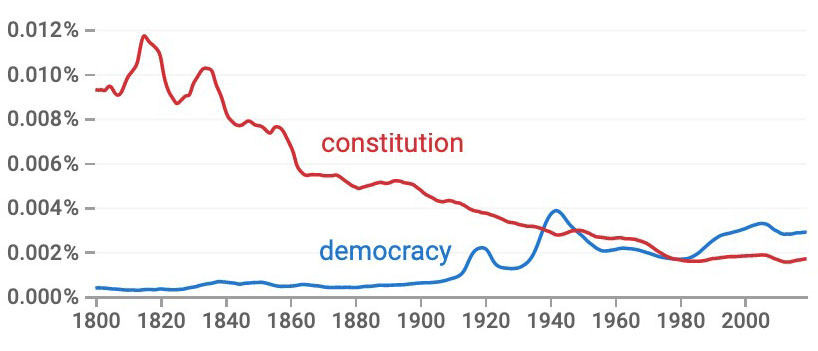
Google Ngram 2021 - Democracy vs. Constitution
The Google Ngram Viewer or Google Books Ngram Viewer is an online search engine that charts the frequencies of any set of search strings using a yearly count of n-grams found in sources printed between 1500 and 2019.

Google Ngram 2021 - Democracy vs. Constitution
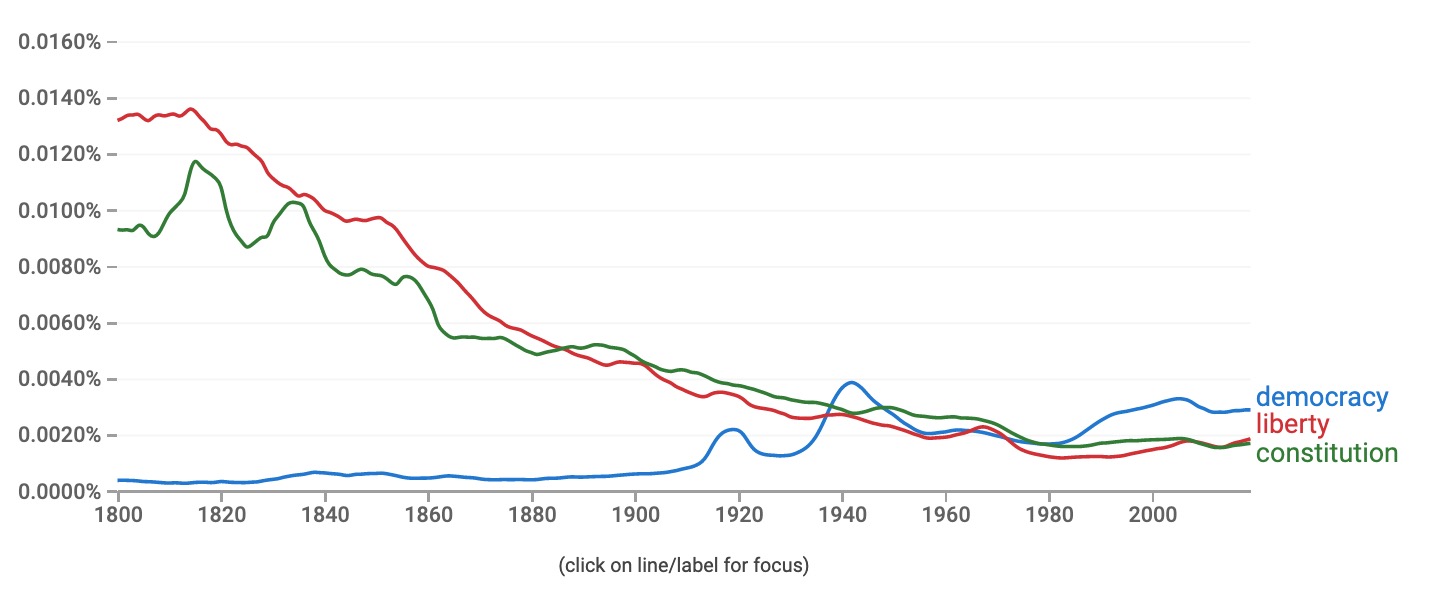
Google Ngram 2021 - Democracy vs. Constitution vs. Liberty
The Google Ngram Viewer or Google Books Ngram Viewer is an online search engine that charts the frequencies of any set of search strings using a yearly count of n-grams found in sources printed between 1500 and 2019.

Google Ngram 2021 - Democracy vs. Constitution vs. Liberty
Many pundits, political scientists and media outlets are pushing the story that democracy isn’t working. They point to results suggesting that voters are unreasonable, irrationally swayed by populist appeals and irrelevant events such as shark attacks and college football games. In Roslyn Fuller’s new book, “In Defence of Democracy,” she offers a roundup of such anti-democratic opinions, noting that philosopher Julian Baggini described trusting the majority “to reach fair and wise decisions as ‘borderline insane’” and that “Plato and Aristotle get a bad rap these days for their rejection of democracy.” Reacting to the Brexit referendum, human rights lawyer Geoffrey Robertson argued, “Democracy has never meant the tyranny of the simple majority.” Foreign Policy ran an article titled “It’s time for the elites to rise up against the ignorant masses.” New York Magazine summarized its columnist Andrew Sullivan’s argument as “Democracies end when they are too democratic.” And Bloomberg News ran an op-ed titled “Voters are making a mess of democracy.”Andrew Gelman 2020
Is it Really Time to Scrap Democracy?
Rather than facilitating popular rule, electoral democracies appear to permit and perhaps even encourage political and economic elites to enrich themselves at the public’s expense and encroach upon the liberty of ordinary citizens.John P. McCormick 2011
Machiavellian Democracy
Suppose elections are free and fair and those elected are racists, fascists, separatists? That is the dilemmaRichard Holbrooke 1996
Democracy and Dictatorship in EuropeNote: Holbrooke famously said these words before the tragic elections in Bosnia that year.
The other example, of Augustus, Lepidus, and Antony, is equally unfortunate. Both are demonstrations that the people did think of usurping others’ rights, and that they did not mind any way to preserve their own. The senate was now annihilated, many of them murdered. Augustus, Lepidus, and Antony were popular demagogues, who agreed together to fleece the flock between them, until the most cunning of the three destroyed the other two, fleeced the sheep alone, and transmitted the shears to a line of tyrants.
How can this writer say, then, that, “while the government remained untouched in the people’s hands, every particuJar man lived safe?” The direct contrary is true. Every man lived safe, only while the senate remained as a check and balance to the people; the moment that control was destroyed, no man was safe.John Adams 1787
Defence of the Consitutions of GovernmentNOTE: Adams respnds to Marchamont Nedham who claims that when the people of Rome were in charge under Anthony or Caesar - and not the Senate - everyone was better off. Adams was horrified by these populist claims.
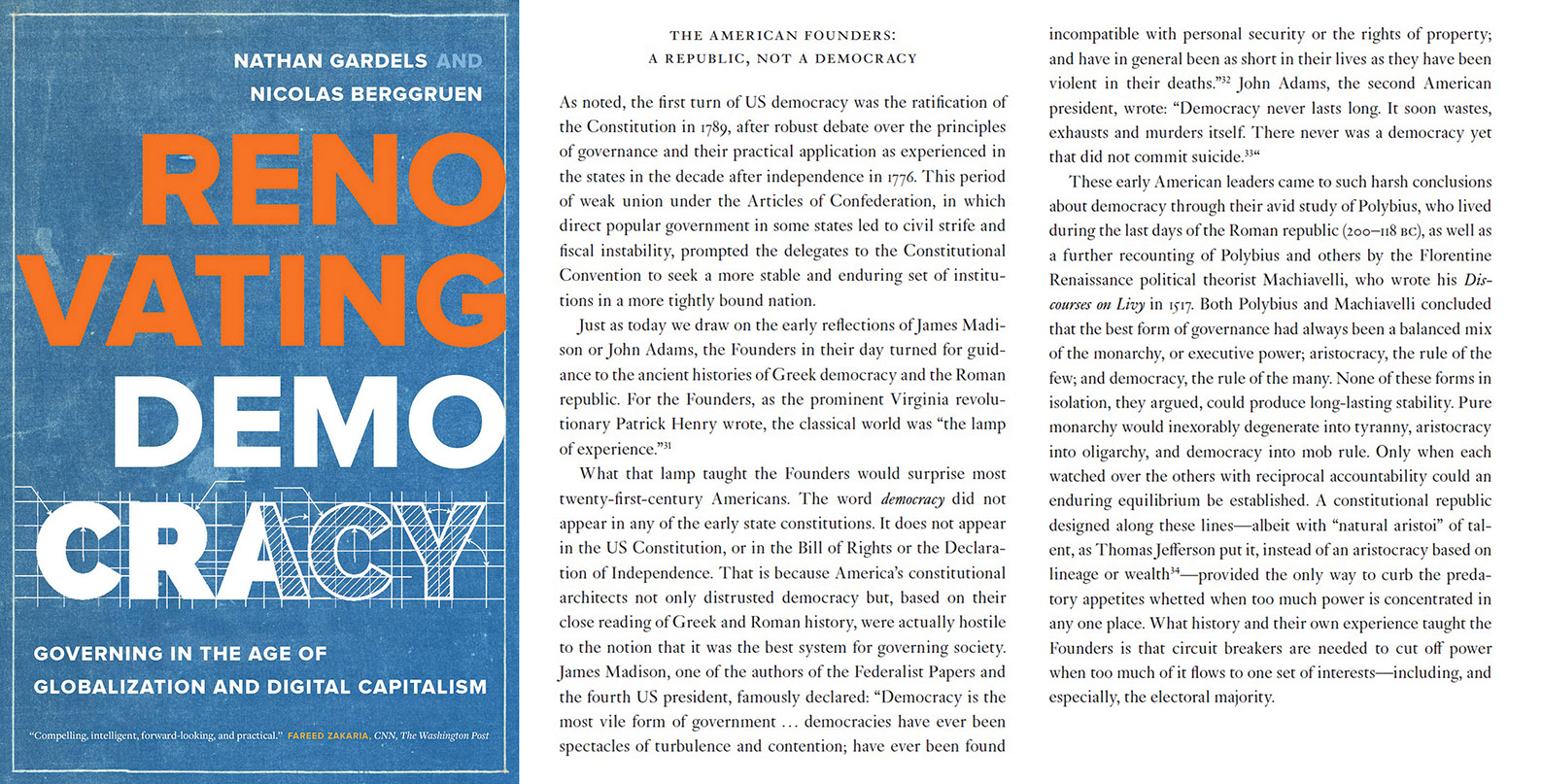
Gardels & Berggruen 2019 - Renovating Democracy

Gardels & Berggruen 2019 - Renovating Democracy
That small-d democratic participation is not very democratic, for one. The kinds of people with the time and energy to show up at community meetings are disproportionately white, disproportionately old, and disproportionately wealthy...They also tend to be conservativeAnnie Lowrey 2022
Four Years Among the NIMBYs
What [history] taught the Founders would surprise most twenty-first-century Americans. The word democracy did not appear in any of the early state constitutions. It does not appear in the US Constitution, or in the Bill of Rights or the Declaration of Independence. That is because America’s constitutional architects not only distrusted democracy but, based on their close reading of Greek and Roman history, were actually hostile to the notion that it was the best system for governing society. James Madison, one of the authors of the Federalist Papers and the fourth US president, famously declared: “Democracy is the most vile form of government... democracies have ever been spectacles of turbulence and contention; have ever been found incompatible with personal security or the rights of property; and have in general been as short in their lives as they have been violent in their deaths.” John Adams, the second American president, wrote: “Democracy never lasts long. It soon wastes, exhausts and murders itself. There never was a democracy yet that did not commit suicide.”
These early American leaders came to such harsh conclusions about democracy through their avid study of Polybius, who lived during the last days of the Roman republic, as well as a further recounting of Polybius and others by the Florentine Renaissance political theorist Machiavelli, who wrote his Discourses on Livy in 1517. Both Polybius and Machiavelli concluded that the best form of governance had always been a balanced mix of the monarchy, or executive power; aristocracy, the rule of the few; and democracy, the rule of the many. None of these forms in isolation, they argued, could produce long-lasting stability. Pure monarchy would inexorably degenerate into tyranny, aristocracy into oligarchy, and democracy into mob rule. Only when each watched over the others with reciprocal accountability could an enduring equilibrium be established. A constitutional republic designed along these lines – albeit with “natural aristoi” of talent, as Thomas Jefferson put it, instead of an aristocracy based on lineage or wealth — provided the only way to curb the predatory appetites whetted when too much power is concentrated in any one place. What history and their own experience taught the Founders is that circuit breakers are needed to cut off power when too much of it flows to one set of interests – including, and especially, the electoral majority.Nathan Gardels & Nicolas Berggruen 2019
Renovating Democracy
For the Founders, popular sovereignty unchecked by the cool and reasoned deliberation of the meritorious few would invite majoritarian intolerance of individual and minority rights and, as occurred in antiquity, degenerate into mob rule and, in turn, summon tyranny to restore order. “No political truth is certainly of greater intrinsic value,” Madison wrote in Federalist No. 47.
For constitutional architects like John Adams, one way to achieve this check and balance was a bicameral legislature, each house of which having a distinct nature, as he first outlined in the spring of 1776 when he was asked by the North Carolina Provincial Congress to provide suggestions for a new government and constitution.
One house, according to Adam’s design, would be a directly elected representative assembly that “should be in miniature an exact portrait of the people at large. It should think, feel and reason like them.” Yet, he feared, such an assembly, by itself, would be “liable to all the vices, follies and frailties of an individual; subject to the fits of humor, starts of passion, flights of enthusiasm, partialities or prejudice, and consequently productive of hasty results and absurd judgments.” Thus, he added, “all these errors ought to be corrected and defects supplied by some controlling power.”
If the immediate and parochial interests and passions of the people were to be reflected in a house of assemblymen, Adams reasoned, then an upper house, or senate fashioned on the Roman model, needed to be interposed. “A people cannot be long free, nor ever happy, whose government is in one assembly,” he wrote. As an upper house, he envisioned a “distinct assembly” of “say twenty or thirty men” who “should have a free and independent exercise of judgment.” Unlike the lower house, this upper house would not be directly accountable to the electorate, but appointed; its mandate would be to look out for the long-term common good, providing dispassionate, sober deliberation on legislation proposed by the lower house. Above all, it would buffer public passions of the moment and protect the stability and continuity of a law-based state.
Senators, the delegates to the upper house, were to embody “the wisdom and foresight of persons” who were learned, wellinformed, and contemplative and who could draw on “a long acquaintance with the history and manners of mankind.” Or, as Hamilton wrote in his notes on the Greek historian Plutarch’s Lives, “The Senate was to the commonwealth what ballast is to a ship.” Madison similarly called a senate a necessary “anchor against popular fluctuations.”
In turn, checks would also have to be put in place to prevent a selected, or indirectly elected, senate from turning into a privileged aristocracy as it did in Roman times. It was out of this worry over incipient aristocracy that, by the 1840s, most states succumbed to the siren call of the democratic temper and implemented direct popular election of the upper houses as well as the assemblies, thus erasing the essential differences in function that Adams thought necessary.
South Carolina senator John C. Calhoun, sometimes referred to as the last Founding Father because he came along in the 1840s, decades after the US Constitution was drafted, felt compelled in the face of this tidal shift from a republican to a democratic sensibility to reinforce the distinction between the two. Calhoun saw that the ongoing expansion of suffrage and direct election of both the upper and the lower house of the legislature, now being proposed at the national level, would grant decisive power to a numerical majority instead of what he called a “concurrent majority.” A concurrent majority entailed agreement between the distinct qualities of a deliberative, indirectly elected Senate and a directly elected House, whose majoritarian claims the Senate was designed to restrain and balance. Calhoun laid out the logic of his thinking in A Disquisition on Government, a book written over six years, from 1843 to 1849 and published posthumously in 1851.
For Calhoun, the whole point of a mixed constitutional republic was “to prevent any one interest, or combination of interests, from using the powers of government to aggrandize itself at the expense of the others.” The notion that “nothing more is necessary than suffrage” extended to all (male) citizens was thus at odds with what Calhoun called “the appropriate organism” that would not only express the will of the majority but embrace the interests of the entire society. In this way, he wrote, “the numerical majority instead of being the people, is only a portion of them.” For Calhoun, majority rule registered at the ballot box wrongly assumed an identity with all interests in society. As he put it, rule solely by a democratic majority in both legislative houses meant the separation of power was only “nominal.” The imposition of limitations and restraints, what Calhoun called “the negative,” is what prevents the majority from absolute domination. “It is, indeed, the negative which makes the constitution—and the positive which makes the government. The one is the power of acting and the other the power of preventing or arresting action. The two, combined, make constitutional government.” The success of ancient Rome, Calhoun noted, was due precisely to the establishment of the tribunes to represent the plebeians, and thus become a “negative” on the aristocratic Senate, and vice versa. It was the balance between the two that cemented the “bond of concord and harmony.” When that balance fell into disequilibrium, the republic collapsed.
To be sure, Calhoun’s disquisition on “the science of government” was not only grounded in his learned reading of the history of republics and his view of how societies worked in real life; they also reflected his concern that the slaveholding South was being subjugated by the more populous North, which was growing rapidly with the advent of textile mills and other early sprouts of industrialization.
The point of Calhoun’s disquisition valuable for this book is that the same incipient democratic spirit that properly resisted making the upper house into a forum of aristocratic privilege or a bastion of slaveowning southerners also slowly eroded its republican function as a “distinct” body meant to check the immediate enthusiasms, interests, and passions of any given electoral majority at any given time.
In the decades following ratification of the Constitution, the expansion of suffrage to all white males (if not yet women, black people, or most American Indians) led to the emergence of political parties—the very “factions” the Framers so disdained—as a means to organize (and manipulate) all those new voters. “By a faction,” James Madison wrote in Federalist No. 10, “I understand a number of citizens, whether amounting to a majority or a minority of the whole, who are united and actuated by some common impulse of passion, or of interest, adverse to the rights of other citizens, or to the permanent and aggregate interests of the community.” To the Framers’ minds, republican mixed government was designed not only to buffer the immediate popular will of a democratic electorate but also as a “disinterested” way of governing that would thwart the efforts of factions or parties to band together across branches in order to impose their will and upset the institutional equilibrium.
Factions organized to mobilize partisan constituencies inevitably sought to dominate the public discourse through connections and money, consolidating into “machines” that disenfranchised average citizens who were not part of the patronage network. Expansion of the number of voters, in effect, tended to empower rather than diminish factional influence precisely because the electorate became so vast that only those who had the time, money, and interest to organize it could gain power.
Paradoxically, then, the expanded franchise led to the disempowerment of the individual voter in favor of organized special interests. What legal scholar Ganesh Sitaraman points out in The Crisis of the Middle Class Constitution (2017) was already true when the voter franchise was first widely extended: “Because of the asymmetry of time and resources, elections are dominated by the organized and the moneyed who are then chosen to govern. Elections even favor the rise of aristocracy.”
By the end of the nineteenth century, much like today, the disruptions of technological change and frustration with the capture of representative democracy by organized special interests fomented a populist revolt.Nathan Gardels & Nicolas Berggruen 2019
Renovating Democracy
It is interesting to contemplate how and why the framers of the American Constitution chose to begin its text with a bang: “We the People…” After all, they, too, had their doubts about that inchoate term: “The People.” In any event: what every high school student knows or, rather, ought to know, is that the Constitution encompassed, at least originally, the ideals of Mixed Government: a “monarchical” element represented by a president and his powers; an “aristocratic” element by the electoral college and by the restrictions, nominations, elections of senators and of the Senate (and somewhat later by the Supreme Court); the “democratic” element by the House of Representatives.
It does not require much historical knowledge (though it may require a certain historical perspective) to see that many, if not all, of the “aristocratic” elements of the Constitution (as also in other countries) have gradually disappeared or were washed away during the past two hundred years, while the monarchic powers of the presidency and the democratic extent of majority rule became more and more overwhelming. (We ought to recognize, too, how the American Constitution, with all its vaunted unique achievements, collapsed in 1861. After more than a decade of pulling and tugging, it was evidently incapable of preventing the breakup of the republic and of a civil war.)
Tocqueville wrote little about mixed government, or about what Americans still call “checks and balances.” But he believed in the few benefits of remaining nondemocratic institutions, restraining total and untrammeled democracy. Thus, for example, in Democracy in America, he observed and praised the American judiciary system and American lawyers (he called them “légistes,” not “avocats”), suggesting that they represented a sort of American elite,with the principal role of restraining unlimited majority rule and the potential tyranny of the latter.
Thus, for example, Tocqueville respected the England of his times (except for its practices in Ireland), including the presence of certain British aristocrats in politics, as befits a constitutional monarchy. But a century and a half later we need not waste much thought on what happened with American lawyers or with the British aristocracy. The political and the social functions that Tocqueville saw and ascribed to them are gone. Democracy has become unlimited, untrammeled, universal. John Lukacs 2005
Democracy and Populism - Fear and Hatred
In 1943 it was the king of Italy (Victor Emmanuel III) who had Mussolini arrested and deposed; in 1945 it was the emperor (Hirohito) who declared Japan’s surrender, the impact of which was even more decisive than either the two atomic bombs cast on Japan or Stalin’s declaration of war a week before. In 1989 and afterward the United States may have been mistaken for not favoring the return of constitutional monarchies in Romania and Yugoslavia and even in Afghanistan. But then in 1917 and 1918 many Americans, and especially liberal and Progressive political spokesmen and intellectuals, argued that World War I, “the war to end all wars,” was a war between Democracy, incarnated by the United States, against Monarchy, incarnated by the Kaiser’s Germany (conveniently overlooking a number of monarchies on the Allied side). John Lukacs 2005
Democracy and Populism - Fear and Hatred
All civilisation has been the work of aristocracies.Winston Churchill 1909
Quoting Lord Curzon
How fickle is History. Today the optimism of 1989 is long gone, replaced by fears that Europe and the West have entered a period of decline. Liberal democracy has faltered in Eastern Europe and is threatened by populism in Western Europe and the United States. Scholars and commentators no longer talk about the triumph of liberal democracy, the “end of history,” and “postnational” politics, but worry instead about “illiberal democracy,” “global authoritarianism,” virulent nationalism, and democratic “deconsolidation.”Sheri Berman 2019
Democracy and Dictatorship in Europe
On the one hand, that openness is very appealing because of its small ‘d’ democratic quality. On the other hand, it can be quite dangerous—potentially putting the Republic in the hands of someone who is, for reasons of temperament or experience or both, unfit for office.Elaine Kamark 2017
Re-inserting peer review in the American presidential nomination process
When a poor autocratic government decides to hold elections it is heavily motivated to win them. In countries without adequate checks and balances, elections tend to be winner-takes-all affairs, with few constraints on the victors. The autocratic incumbents reluctantly realize they are not popular and will need to "adjust" the electoral balance. To do so, they resort to a variety of techniques, including various forms of bribery, electoral fraud, coercion, elimination of opponents (by dubious legal trickery, or worse) and last but not least, by playing the ethnic identity card to rally the majority ethnicity against its "enemies".Paul Collier 2009
Wars, Guns and Votes
Binding primaries were certainly more democratic. But might they be too democratic? By placing presidential nominations in the hands of voters, binding primaries weakened parties’ gatekeeping function, potentially eliminating the peer review process and opening the door to outsiders. Just before the McGovern-Fraser Commission began its work, two prominent political scientists warned that primaries could “lead to the appearance of extremist candidates and demagogues” who, unrestrained by party allegiances, “have little to lose by stirring up mass hatreds or making absurd promises.” Seven Levitsky & Daniel Ziblatt 2018
How Democracies Die
One of the reasons that Enlightenment philosophers (and politicians) insisted on liberalism first while holding calls for universal suffrage at bay was their understanding, dating back to the ancient Greeks, of the tension between popular democracy and responsible government.Shadi Hamid 2023
The Problem of Democracy
When Chávez launched his promised revolution, he did so democratically [via referendums]. In 1999, he held free elections for a new constituent assembly, in which his allies won an overwhelming majority. This allowed the chavistas to single-handedly write a new constitution. It was a democratic constitution, though, and to reinforce its legitimacy, new presidential and legislative elections were held in 2000. Chávez and his allies won those, too.Seven Levitsky & Daniel Ziblatt 2018
How Democracies Die
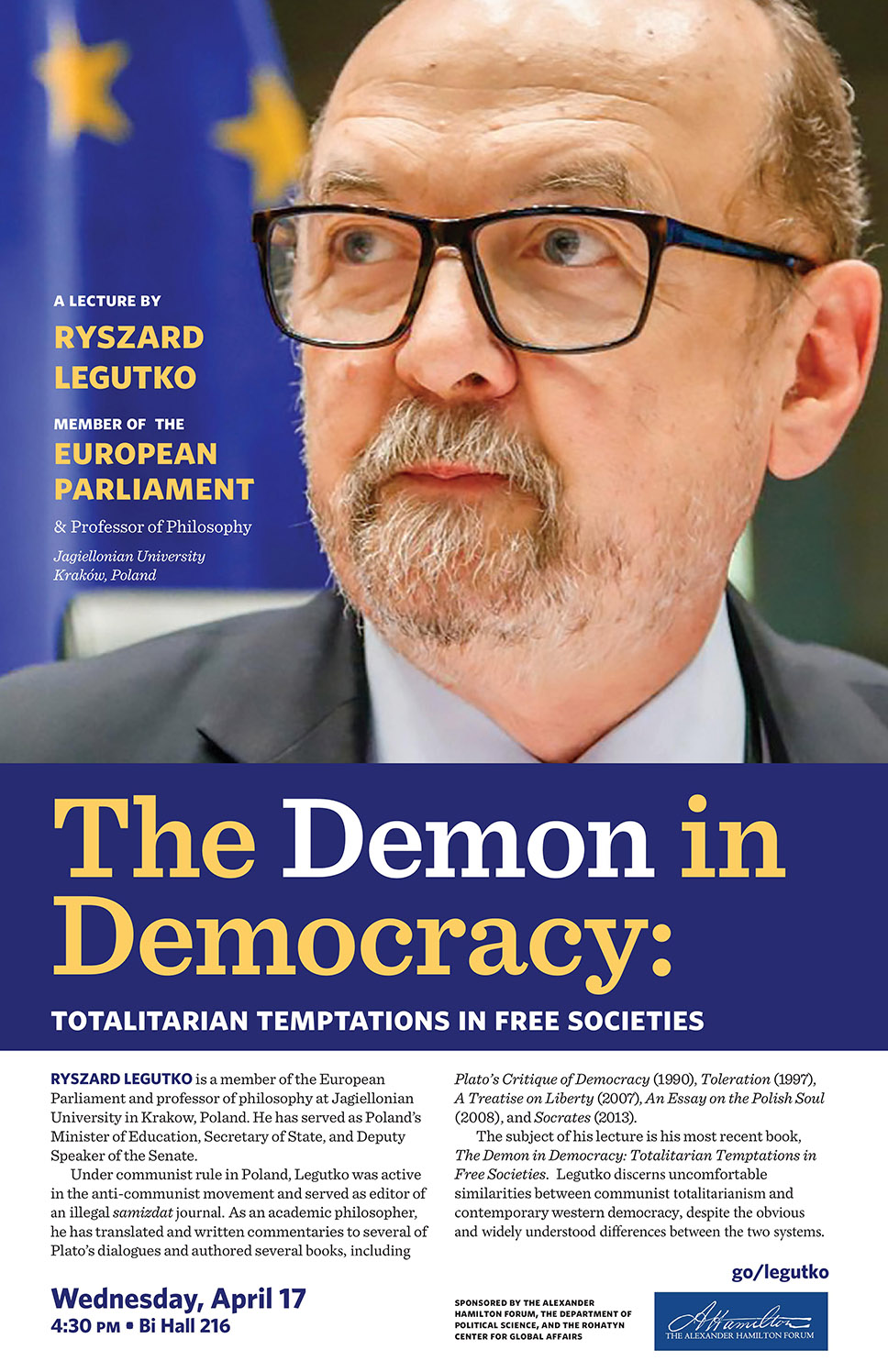
Legutko 2019 - The Demon in Democracy

Legutko 2019 - The Demon in Democracy
“Legutko discerns uncomfortable similarities between communist totalitarianism and contemporary western democracy, despite the obvious and widely understood differences between the two.”Ryszard Legutko 2019
Lecture Introduction - The Demon in Democracy
As for liberal democracy, the belief still lingers that it is a system of breathtaking diversity. But this belief has deviated from reality so much that the opposite view seems now closer to the truth. Liberal democracy is a powerful unifying mechanism, blurring differences between people and imposing uniformity of views, behavior, and language.Ryszard Legutko 2019
The Demon in Democracy
When we look at communism and liberal democracy from this point of view, we can see that they are both fuelled by the idea of modernization. In both systems a cult of technology translates itself into acceptance of social engineering as a proper approach to reforming society, changing human behavior, and solving existing social problems.Ryszard Legutko 2019
The Demon in Democracy
Julius Caesar was a charismatic and unconventional politician who knew what the masses wanted to hear. He used his immense wealth to fight his way to the highest ranks of political power. The old guard politicians of Rome were horrified at his rise and did everything they could to stop him, but nothing worked. The more the establishment spoke against him, the more the common people loved him. And so the masses cheered when Caesar crossed the Rubicon River in 49 B.C. and swept away the career politicians. He promised to shake things up and he did, but it wasn’t long before he proclaimed himself dictator for life. He was killed on the Ides of March in 44 B.C. But by then it was too late. The structures of republican government had been laid waste and the voice of the people was silenced for the rest of the Roman Empire.Philip Freeman 2016
What History Teaches Us About Demagogues
Democracies breed demagogues.Loren J. Samons II 2016
What History Teaches Us About Demagogues
Is there a drug, or a vaccine [for demagogues in Germany]? [Yes, less democracy.] The constitution of the Federal Republic of Germany has very intentionally dispensed with the post of a directly elected president, and the government is elected by the parliament. In addition, the Federal Council is not controlled by directly elected senators but by the regional governments. We currently have a chancellor whose theatrical talent is about zero and whose plain, factual tone is virtually a cult.Daniel Schily 2016
What History Teaches Us About DemagoguesNOTE: Reading the above it is almost imposssible to believe that Daniel Schily is one of the co-founders of Democracy International whose activism for direct democracy dates back more than 25 years. In the quote above (which he wrote in response to Trump and Brexit) Schily is advocating for precisely the opposite of direct democracy.
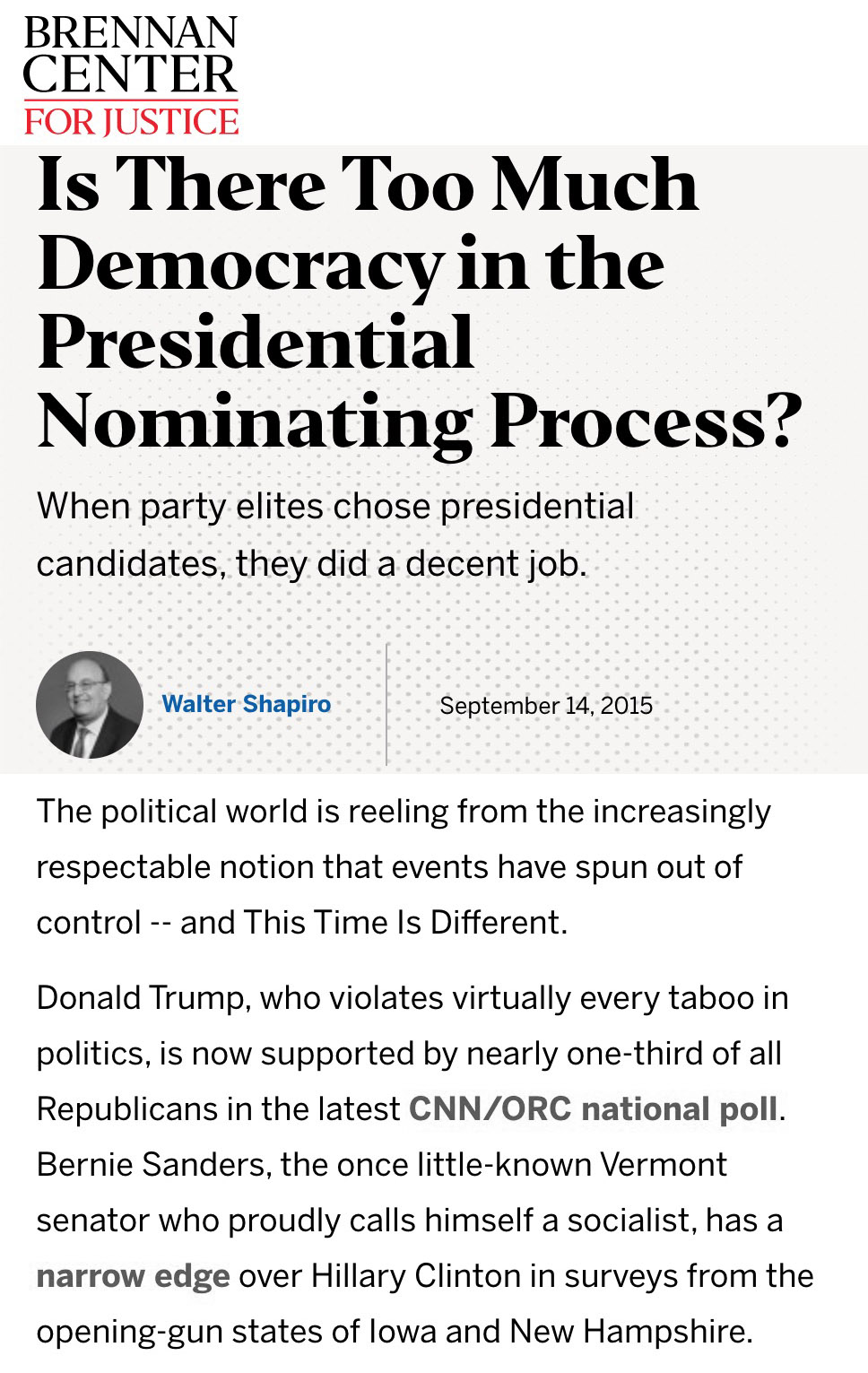
Shapiro 2015 - Too Much Democracy

Shapiro 2015 - Too Much Democracy
It is easy to say that the cure for the ills of democracy is more democracy. But right now the fear lingers that this slogan may not nearly be as true as usual in the 2016 primaries. Walter Shapiro 2015
Too Much Democracy
Peace is important, but 10% less democracy isn’t likely to detectably change the probability of peace, up or down.Garrett Jones 2020
10% Less Democracy
Voter involvement in government has not only benefits but costs – costs that are too often ignored.Garrett Jones 2020
10% Less Democracy
The founders of the American Republic were almost as distrustful of democracy as they were rebellious against royal decrees. They were steeped in the writings of philosophers such as John Locke, who proposed a social-contract theory to justify representative government against the claims of absolute monarchy, and Montesquieu, who urged the separation of legislative, executive, and judicial branches as a safeguard against abuse of power in a democracy. As their disciples, the writers of the Constitution placed the legislative branch first in their document—and preeminent in power—with independent executive and judicial branches providing the necessary checks and balances. David Broder 2000
Democracy Derailed - Initiative Campaigns and the Power of Money
Thus, the rationale for making the United States a republic, rather than a democracy, rested on a healthy apprehension of the dangers of direct democracy and the manifold risks of relying on simple majority rule. Direct democracy, Fisher Ames of Massachusetts wrote, “would be very burdensome, subject to factions and violence; decisions would often be made by surprise, in the precipitancy of passion It would be a government not by laws but by men.” The threats, as the founders envisaged them, ranged from raids on the treasury and shifting of tax burdens from one constituency to another, to the infringement of civil liberties, the submersion of minority viewpoints and interests, and even the destabilization of the entire political order.David Broder 2000
Democracy Derailed - Initiative Campaigns and the Power of Money
Although none of the founding fathers can be called a political philosopher, most of them were widely read in political philosophy and had given serious thought to the traditional problems of political philosophy. One of these traditional problems was the problematic character of democracies. The founding fathers were aware that, in centuries past, democracy—in the sense of the unfettered rule of the demos, of the majority—had been one of the least stable and not always the most admirable of political regimes In short, the founding fathers sought to establish “a popular government” that could be stable, just, free; where there was security of person and property; and whose public leaders would claim legitimacy not only because they were elected officials but also because their character and behavior approximated some accepted models of excellence They were partisans of self-government—of government by the people—who deliberately and with a bold, creative genius “rigged” the machinery of the system so that this government would be one of which they, as thoughtful and civilized men, could be proud.
In establishing such a popular government, the founding fathers were certainly under the impression that they were expressing a faith in the common man. But they were sober and worldly men, and they were not about to hand out blank checks to anyone, even if he was common man They took it for granted that democracy was capable of bringing evil into the world, and they wanted a system of government that made this as unlikely as possible, and that was provided with as strong an inclination toward self-correction as was possible. And I should guess that they would have regarded as a fair test of their labors the degree to which common men in America could rise to the prospect of choosing uncommon men, speaking for uncommon ideals, as worthy of exercising authority over them. Irving Kristol 1972
On the Democratic Idea in America,
Rampant self-interest made perfect self-government impossibleNancy Isenberg & Andrew Burstein 2019
The Problem of Democracy
Democracy was meant to overcome defeatist tendencies. It is presumed to guard against rule by those who disregard the rights and interests of the many. The Adamses never swallowed that Jeffersonian bromide; they saw the allure of power pervert as many reputed democrats as self-acknowledged elitists. Their studies of moral philosophy and world history produced in them unsentimental ideas about human psychology. If there is a twenty-first-century lesson to be taken from our study of the two presidents Adams and the contentious character of democracy, it has most to do with the obstinacy of those who indulge in wishful thinking when greater circumspection (and honest introspection) would do us all good. The danger of complacency, the danger of blind pride, exists as the state tilts toward injudicious acts while mollifying, in soft words, the credulous mass of citizens. Say what you will of John and John Quincy Adams, they were onto something when they observed that the errors of the people threatened "government by the people.Nancy Isenberg & Andrew Burstein 2019
The Problem of Democracy
In Barro’s classic estimate, going from an average level of democracy to the highest levels was associated with 1.6% lower annual economic growth per person.¹⁸ Over the course of a thirty-year generation, that would mean ending up about one-third poorer than a similar country that stuck with a medium level of democracy. Over three generations – the lives of our grandchildren – the miracle of compound growth means that the medium-democracy country would end up vastly richer than the high- democracy country. Garrett Jones 2020
10% Less Democracy
The less political, the less democratic, the more insider driven the nation’s central bankis, the better the outcomes.Garrett Jones 2020
10% Less Democracy
The ancient philosophers always had their doubts about democracy. Plato feared the “false and braggart words” of the demagogue, and suspected democracy might be nothing more than a staging point on the road to tyranny. Early American advocates of republican government also recognized the challenge that a corrupt leader could pose to democracy, and thought hard about creating the institutions that would resist one. The Constitutional Convention of 1787 created the electoral college as a means of ensuring that a man with what Alexander Hamilton called “talents for low intrigue, and the little arts of popularity” could never become president of the United States. Although it eventually became a rubber-stamp body with no power—and, more recently, a mechanism that gives outsize influence to small groups of voters in a few states—the electoral college was originally meant to be something quite different: it was designed as a kind of review board, a group of elite lawmakers and men of property who would select the president, rejecting the people’s choice if necessary, in order to avoid the “excesses of democracy.”
Hamilton was one of many in colonial America who read over and over again the history of Greece and Rome, trying to learn how to prevent a new democracy from becoming a tyranny. In his old age, John Adams was once again reading Cicero, the Roman statesman who sought to halt the deterioration of the Roman Republic, even quoting him in letters to Thomas Jefferson. They wanted to build democracy in America on the basis of rational debate, reason, and compromise. But they had no illusions about human nature: They knew that men could sometimes succumb to “passions,” to use their old-fashioned word. They knew that any political system built on logic and rationality was always at risk from an outburst of the irrational.Anne Applebaum 2020
The Twilight of Democracy
The error which limits republican government to a narrow district, has been unfolded and refuted in preceding papers. I remark here only, that it seems to owe its rise and prevalence chiefly to the confounding of a republic with a democracy: And applying to the former reasonings drawn from the nature of the latter. The true distinction between these forms was also adverted to on a former occasion. It is, that in a democracy, the people meet and exercise the government in person; in a republic they assemble and administer it by their representatives and agents. A democracy consequently must be confined to a small spot. A republic may be extended over a large region.
To this accidental source of the error may be added, the artifice of some celebrated authors, whose writings have had a great share in forming the modern standard of political opinions. Being subjects either of an absolute, or limited monarchy, they have endeavoured to heighten the advantages or palliate the evils of those forms; by placing in comparison with them, the vices and defects of the republican, and by citing as specimens of the latter, the turbulent democracies of ancient Greece, and modern Italy. Under the confusion of names, it has been an easy task to transfer to a republic, observations applicable to a democracy only, and among others, the observation that it can never be established but among a small number of people, living within a small compass of territory.James Madison 1788
Federalist 14NOTE:
“For all the veneration of the ‘people,’ [to the Framers] the word ‘democracy’ retained an unequivocally negative connotation.” - Jill Lepore 2018
In the Federalist papers, ‘democracy’ was used as something to contrast their government to. Not once do they claim they are constructing a democracy and they often make reference to how democracies are easily captured by special interests and demagogues and lead to their own forms of tyranny.
A great vice in most ancient republics was that the people had the right to make resolutions for action, resolutions which required some execution, which altogether exceeds the people’s capacity. The people should not enter the government except to choose their representatives; this is quite within their reach... Therefore, the part they have in legislation should be in proportion to the other advantages they have in the state, which will happen if they form a body that has the right to check the enterprises of the people, as the people have the right to check theirs.Montesquieu 1748
Spirit of the Laws
In a government where numerous and extensive prerogatives are placed in the hands of an hereditary monarch, the executive department is very justly regarded as the source of danger, and watched with all the jealousy which a zeal for liberty ought to inspire. In a democracy, where a multitude of people exercise in person the legislative functions, and are continually exposed, by their incapacity for regular deliberation and concerted measures, to the ambitious intrigues of their executive magistrates, tyranny may well be apprehended, on some favorable emergency, to start up in the same quarter.James Madison 1788
Federalist 48NOTE:
“For all the veneration of the ‘people,’ [to the Framers] the word ‘democracy’ retained an unequivocally negative connotation.” - Jill Lepore 2018
In the Federalist papers, ‘democracy’ was used as something to contrast their government to. Not once do they claim they are constructing a democracy and they often make reference to how democracies are easily captured by special interests and demagogues and lead to their own forms of tyranny.
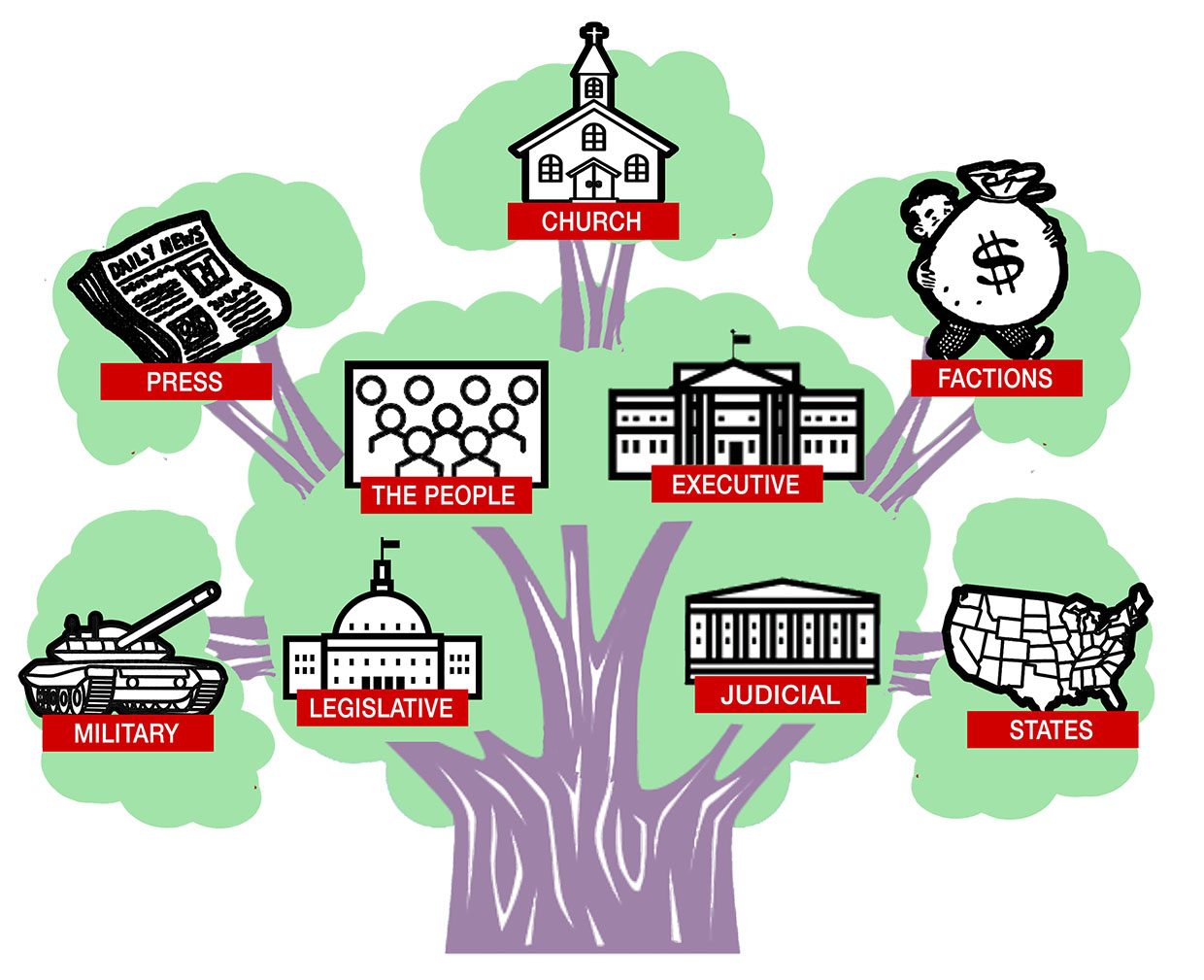
James D’Angelo 2021 - The Decentralized Way the Framers Viewed Separation of Powers

James D’Angelo 2021 - The Decentralized Way the Framers Viewed Separation of Powers
Throughout history the most successful democracies have provided elaborate isolation from the people.James D’Angelo 2019
What’s Wrong with Transparency?
“Well, television isn’t the ‘truth’! It’s a goddamn amusement park! We’ll tell you whatever you want to hear!” Chayefsky insisted the criticism was rooted in real truth. Networks were focused on ad revenue, and therefore on ratings above all else, even in the news divisions. “Television is democracy at its ugliest...Give the people what they want.”Paddy Chayefsky 1976
Fault Lines
Democracies cause wars. They are susceptible to the ugliest tides of public opinion. They can destroy themselves and have done so many times. Many people now believe, as did Austrian economist Joseph Schumpeter, that democracy is ‘rule by means of lies” exercised by corrupt politicians. Look at the frayed status of such democratic concepts as habeas corpus as liberties are reduced, ostensibly to fight ‘terror”. Look at declining voter interest levels.Editor 2007
The devil is in the democracy
We’ve come to think of democracy just as a word that means things we like. We name governments we like ‘democratic’ and governments we don’t like ‘undemocratic.’Loren J. Samons II 2016
Boston University Rhett Talks
An examination of Pericles’ career will illustrate the benefits and dangers of charismatic leadership in an environment of popular rule. I hope to suggest that the vote – especially in an environment with few social restraints or civic responsibilities – represents a threat to, as much as an instrument of, justice.Loren J. Samons II 2007
What’s Wrong with Democracy?
Tocqueville believed that in aristocratic times there were always countervailing centers of power. Kings, no matter how powerful, always had to contend with fractious and warlike nobilities but, again, who or what can exercise that countervailing power in a world where the people in their collective capacity have, to repeat, become the king? Who or what has the power to check the popular will or the general will? This is the problem, how to check democratic power.Steven Smith (Yale) 2006
Intro to Political Philosophy
There’s a good reason the Founders of America had questions about democracy. And they didn’t look at Athens as a model for America to be founded on.Loren J. Samons II 2016
Boston University Rhett Talks
For centuries in many of the rich democracies, the judicial branch has been even more completely handed over to unelected lawyers who have long, often lifelong, terms of office. This undemocratic practice is mostly taken for granted, rarely criticized to any substantial degree. Writing about the U.S. high court in 2018, Ezra Klein of Vox notes, “The Supreme Court has always been undemocratic.” ... Across the political spectrum, people applaud the undemocratic imposition of policies such as marriage equality, gun owners’ rights, racially integrated schools, or radical religious liberty on an often-hostile citizenry. The “independent” judiciary – again, that code word that really means “undemocratic” – is one of the crowning achievements of the world’s legal systems.Garrett Jones 2020
10% Less Democracy
The findings mean that growth would likely be reduced by further democratization in countries such as Mexico and Malaysia, which exhibit intermediate levels of the democracy indicator (0.5) in 1994. Moreover, future growth will probably be retarded by the political liberalizations that have already occurred in places such as Chile, Korea, and Taiwan.Robert Barro 1996
Democracy and Growth
For all the veneration of the “people,” the word “democracy” retained an unequivocally negative connotation. Eighteenth-century Americans borrowed from Aristotle the idea that there are three forms of government: a monarchy, an aristocracy, and a polity; governments by the one, the few, and the many. Each becomes corrupt when the government seeks to advance its own interests rather than the common good. A corrupt monarchy is a tyranny, a corrupt aristocracy an oligarchy, and a corrupt polity a democracy. The way to avoid corruption is to properly mix the three forms so that corruption in any one would be restrained, or checked, by the others.Jill Lapore 2018
These Truths
Democracy as we know it today, in its naive form of ultra-Democracy, is a relatively new experiment. It came in with the Presidency of Andrew Jackson, whom Jefferson had opposed politically as a dangerous man. It came with the opening up of the West and with the election of a President who, for the first time, was born neither in New England nor in Virginia. In President Jackson and his crowd we find, perhaps for the first time in history, the belief in Democracy as a government which should be run exclusively by the men of shirt sleeves and the spittoon. This was obviously a different theory of Democracy from that of Jefferson, yet Jackson held it without reserve.Henry R. Carey 1928
Leadership or Mob Rule?
Here in America there has been too marked a tendency to view democracy as a sunlit Arcadia. We have failed to give due consideration to human nature in devising our machinery of government. No educator or parent today overlooks the fact that if boys were left free to go to school or not as they pleased our whole educational system would collapse like a house of cards.Samuel Spring 1922
The Voter Who Will Not Vote (Harper’s)
The seeming truism – that increasing voters’ direct control of decisions and politicians enhances democratic accountability – has, in fact, the opposite effect. The remedies turn out to be the political equivalent of bloodletting. Either they have no impact on the malady they are meant to address or – more often – they make it worse.Frances Rosenbluth & Ian Shapiro 2018
Responsible Parties
Much of the Framers’ disdain for democracy derived from their hostility to the populist economic policies that a majority of states had enacted in the mid-1780s in response to a severe economic contraction—principally, paper money laws and debtor relief legislation. The Framers overwhelmingly regarded such laws as craven capitulations by overly responsive state legislatures to the illegitimate demands of lazy and dissolute farmers. Such legislation was “wicked and fraudulent”; it “corrupted the morals of the people”; and it enabled “idle spendthrifts [and] dissipating drones of the community” to live “upon the sweat of their neighbors’ brows.”Michael Klarman 2017
The Framers, Democracy, and the Demagogue
Elite statesmen of the 1780s blamed tax and debt relief legislation on overly democratic state constitutions. Charles Lee of Virginia told George Washington that unless state legislatures could be reconstructed to make them “more powerful and independent of the people, the public debts and even private debts will in my opinion be extinguished by [them].”Michael Klarman 2017
The Framers, Democracy, and the Demagogue
Americans rarely pause to consider just how bizarre the presidential nominating process has become. No other major democracy routinely uses primaries to choose its political candidates, nor did the Founders of this country intend for primaries to play a role in the republican system they devised. Abraham Lincoln did not win his party’s nomination because he ran a good ground game in New Hampshire; rather, Republican elders saw in him a candidate who could unite rival factions within the party and defeat the Democratic nominee in the general election. Today’s system amounts to a radical experiment in direct democracy, one without precedent even in America’s own political history.Jonathan Rauch & Ray La Raja 2019
Too Much Democracy Is Bad for Democracy
Ballot initiatives in California are bankrolled by wealthy elites for their own purposes. Take Prop 71, the California Stem Cell Research Initiative of 2004 that was supported by a real estate developer to set up a $3 billion full employment act for him and a highly educated class of technocrats in a state that is broke.Wayne Lusvardi 2011
Recapturing Machiavelli Away from his Captors
This may seem like an argument for elitism over democracy, but the current system is democratic only in form, not in substance. Without professional input, the nominating process is vulnerable to manipulation by plutocrats, celebrities, media figures, and activists. As entertainment, America’s current primary system works pretty well; as a way to vet candidates for the world’s most important and difficult job, it is at best unreliable—and at worst destabilizing, even dangerous.Jonathan Rauch & Ray La Raja 2019
Too Much Democracy Is Bad for Democracy
The results of political decentralization are often perverse. Primaries and caucuses allow extreme minorities to pick candidates. Visible signs of this are the Tea Party’s power over congressional Republicans and Donald Trump’s selection as the Republican candidate in the 2015–16 primaries by a highly unrepresentative 5 percent of the U.S. electorate. In the UK, direct election meant that activists reelected Jeremy Corbyn as Labour leader when he had just lost a confidence vote in his parliamentary party by 172 to 40. Majority minority districts often weaken parties that serve minorities’ interests. Term limits increase the gridlock that most voters abhor: why work with lame ducks when you can just wait them out? Ballot initiatives generate myopic decisions that often frustrate voter preferences. Far from enhancing democracy, these disconnected reforms create Rube Goldberg machines that undermine it.Frances Rosenbluth & Ian Shapiro 2018
Responsible Parties - Saving Democracy From Itself
Reformers typically focus instead on one aspect of the system deemed insufficiently democratic and then devise reforms without attending to their knock-on effects.Frances Rosenbluth & Ian Shapiro 2018
Responsible Parties - Saving Democracy From Itself
Since the 1960s, powerful movements across the democratic world have pursued reforms meant to bring politics closer to the people. Many political parties have adopted primaries, local caucuses, and other decentralized ways of choosing candidates. Districts have been redrawn to ensure selection of racial and ethnic minorities. Party members more often elect their leaders directly. There has been greater use of ballot initiatives, referendums, and plebiscites. Many countries with legislatures elected by proportional representation (PR) are moving toward greater voter choice as well. Unlike closed-list PR systems in which centralized parties offer voters competing policy platforms, open-list PR allows voters to choose individual candidates, injecting an element of personal accountability. These changes are touted as democratic enhancements: they move decisions closer to the people and they elect politicians who are less remote from—and more responsive to—the voters they represent.Frances Rosenbluth & Ian Shapiro 2018
Responsible Parties - Saving Democracy From Itself
I remember, in Iraq for example, that we went through a period of feeling that we should delay democracy. We went through a period of feeling that the lesson learnt from Bosnia was that elections held too early enshrine sectarian violence, enshrined extremist parties. So in Iraq in 2003, decision was made, let’s not have elections for two years. Let’s invest in voter education, let’s invest in democratization. The result was, that I found, stuck outside my office, a huge crowd of people... standing outside screaming for the elections. And when I went out and said, “What is wrong with the interim provincial council? What is wrong with the people that we have chosen? There is Sunnite Sheikh, there is a Shiah Sheikh, there’s the seven leaders of the seven major tribes, there is a Christian, there is a Serbian, there are female representatives, there is every political party in this council, what’s wrong with the people that we chose?” The answer came, “The problem isn’t the people that you chose, the problem is that you chose them.” I have not met, in Afghanistan, in even the most remote community anybody who does not want a say in who governs them. Most remote community, I’ve never met a villager who does not want a vote. So, we need to acknowledge that despite the dubious statistics, despite the fact that 84% of people in Britain feel politics is broken, despite the fact that when I was in Iraq, we did an opinion poll in 2003 and asked people what political systems they prefered and the answer came back that 7% wanted United States, 5% wanted France, 3% wanted Britain, and nearly 40% wanted Dubai which is after all not a democratic state at all, but relatively prosperous minor monarchy.Rory Stewart 2013
Is democracy the only way?
Madison’s reading convinced him that direct democracies—such as the assembly in Athens, where 6,000 citizens were required for a quorum—unleashed populist passions that overcame the cool, deliberative reason prized above all by Enlightenment thinkers. “In all very numerous assemblies, of whatever characters composed, passion never fails to wrest the sceptre from reason,” he argued in The Federalist Papers, the essays he wrote (along with Alexander Hamilton and John Jay) to build support for the ratification of the Constitution. “Had every Athenian citizen been a Socrates, every Athenian assembly would still have been a mob.”Jeffery Rosen 2018
America Is Living James Madison’s Nightmare
To prevent factions from distorting public policy and threatening liberty, Madison resolved to exclude the people from a direct role in government. “A pure democracy, by which I mean a society consisting of a small number of citizens, who assemble and administer the government in person, can admit of no cure for the mischiefs of faction,” Madison wrote in “Federalist No. 10.” The Framers designed the American constitutional system not as a direct democracy but as a representative republic, where enlightened delegates of the people would serve the public good. They also built into the Constitution a series of cooling mechanisms intended to inhibit the formulation of passionate factions, to ensure that reasonable majorities would prevail.Jeffery Rosen 2018
America Is Living James Madison’s Nightmare
Too much participation by the multitudes, the elite believed, would undermine good order. It would prevent the creation of a secure and united republican society. The Philadelphia physician and politician Benjamin Rush, for example, sensed that the Revolution had launched a wave of popular rebelliousness that could lead to a dangerous new type of despotism. “In our opposition to monarchy,” he wrote, “we forgot that the temple of tyranny has two doors. We bolted one of them by proper restraints; but we left the other open, by neglecting to guard against the effects of [the people’s] ignorance and licentiousness.”Editor 2018
Democracy in the Early Republic
The immediate problem the delegates were charged with addressing — that chaos — was Congress’s debt, its lack of cash, and its inability to raise taxes or to suppress popular revolt or to resolve conflicts between the states. But, like many other delegates, Randolph believed that the work of the convention was to counter the tendencies of the state constitutions. “Our chief danger arises from the democratic parts of our constitutions,” he said. Massachusetts firebrand Elbridge Gerry agreed that the states suffered from an “excess of democracy.” Randolph believed that the point of the convention was “to provide a cure for the evils under which the United States labored; that in tracing these evils to their origin every man had found it in the turbulence and follies of democracy: that some check therefore was to be sought for against this tendency of our Governments.” Jill Lepore 2018
These Truths
Hamilton mistrusted the political capacities of the common people and insisted on deference to elites. In a speech delivered at the Constitutional Convention, Hamilton praised the hierarchical principles of the British political system. He argued, for example, that the new American president and senators should serve for life. Many of the Convention participants feared the “excess of democracy,” but Hamilton went much further. He wanted to bring an elective monarchy and restore non-titled aristocracy to America. “The people are turbulent and changing,” he declared. “They seldom judge or determine right.” They must be ruled by “landholders, merchants and men of the learned professions,” whose experience and wisdom “travel beyond the circle” of their neighbors. For America to become an enduring republic, Hamilton argued, it had to insulate rulers and the economy as much as possible from the jealous multitude.Jason Frank & Isaac Kramnick 2016
What ‘Hamilton’ Forgets About Hamilton
At the Constitutional Convention, both Elbridge Gerry (on May 31) and Alexander Hamilton (on June 18) identified the principal problem facing the United States in the aftermath of the Revolutionary War as an “excess of democracy.” In short, the American Revolution had gone too far.Woody Holton 2005
An “Excess of Democracy” – Or a Shortage?
Democracy was a form of coercion.Daniel Okrent 2010
Last Call
When polled in isolation, majorities often support cutting taxes, even taxes like the estate tax that most of them don’t pay. But that support disappears if the cuts are paired with losing benefi ts that they value – such as Medicare prescription drugs coverage. This disjunction extends from polling to actual politics. Proposition 13, which in 1978 limited California property taxes to 1 percent of assessed value, passed by almost a two-thirds majority in a stand-alone ballot initiative. Yet most Californians were distressed by the resulting decline in the quality of their public schools. Had they been forced to consider property taxes and school funding together, the outcome might well have been different. The point is general: every policy has consequences for other policies that people also care about. We ignore this fact when we consider policies in silos. Only a political system that bundles issues in ways that force voters to consider their interaction can address their needs taken as a whole.Frances Rosenbluth & Ian Shapiro 2018
Responsible Parties - Saving Democracy From ItselfNOTE: Lots of scholars discuss the problems of direct democracy through referenda, referendum or initiatives, where special interests readily capture the public opinion.
Despite this long antidemo cratic tradition, seldom have today’s champions of democracy acknowledged its complexities and flaws.Bruce Thornton 2014
Democracy’s Dangers and Discontents
Democracy is chargeable with all the blood that has been spilled for five and twenty years. Napoleon and all his Generals were but Creatures of Democracy as really as Rienzi Theodore, Mazzianello, Jack Cade or Wat Tyler. This democratical, Hurricane, Inundation, Earthquake, Pestilence call it which you will, at last arroused and alarmed all the World and produced a Combination unexampled, to prevent its further Progress.John Adams 1814
Letter to John Taylor
The major American parties have ceded unprecedented power to primary voters. It’s a radical experiment—and it’s failing.Jonathan Rauch & Ray La Raja 2019
Too Much Democracy Is Bad for Democracy

